Marketing Plan for Eco Shoes: Targeting Millennials with Sustainable and Stylish Footwear
VerifiedAdded on 2023/06/09
|28
|1380
|388
AI Summary
This presentation outlines a marketing plan for eco shoes made from recycled tires, targeting millennials with sustainable and stylish footwear. It includes an overview of the product, strengths and weaknesses, target market, current market trends, situation analysis, and marketing objectives. The presentation also covers brand positioning, marketing mix, and an action plan for implementing the marketing strategy.
Contribute Materials
Your contribution can guide someone’s learning journey. Share your
documents today.
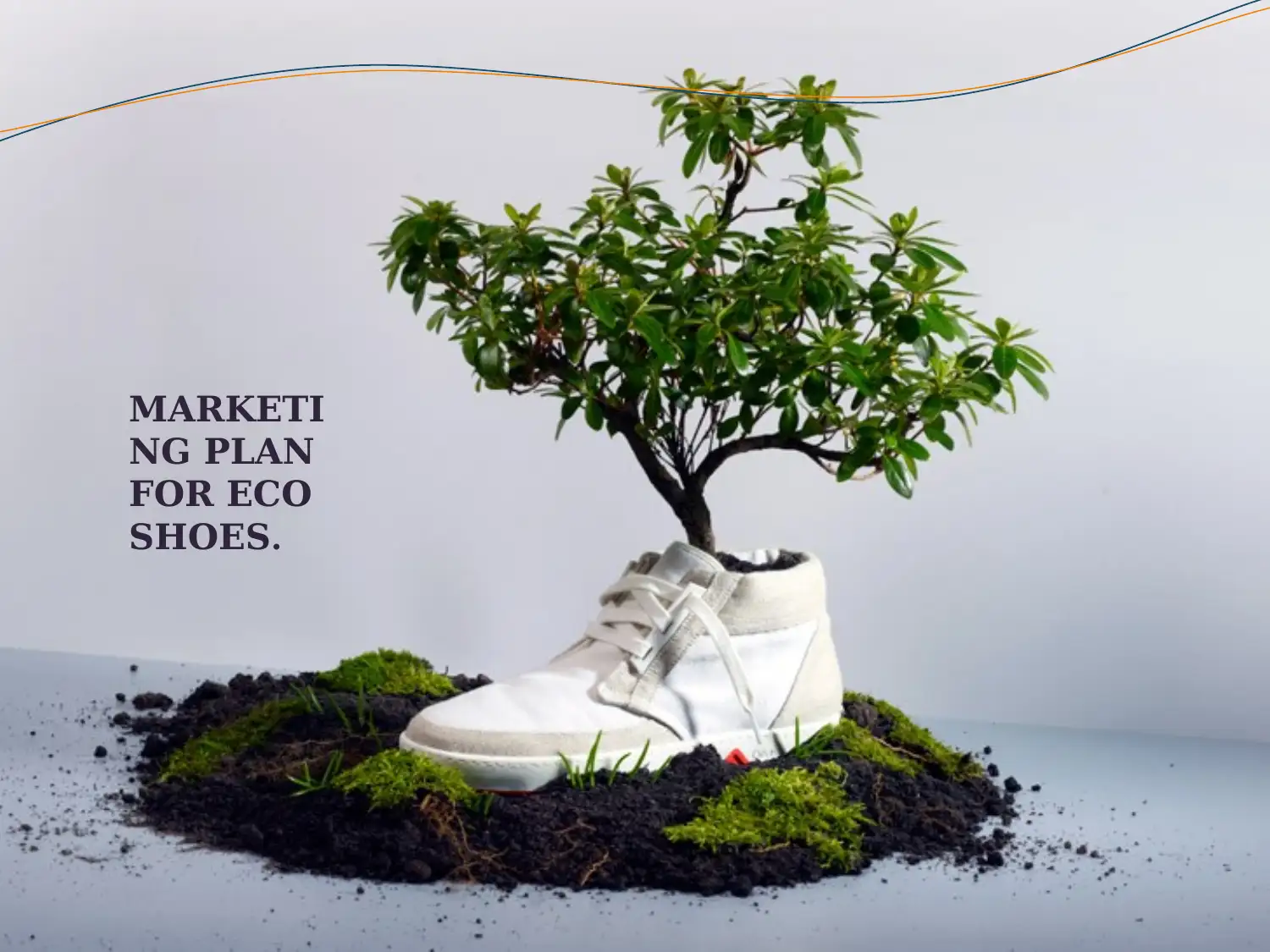
MARKETI
NG PLAN
FOR ECO
SHOES.
NG PLAN
FOR ECO
SHOES.
Secure Best Marks with AI Grader
Need help grading? Try our AI Grader for instant feedback on your assignments.
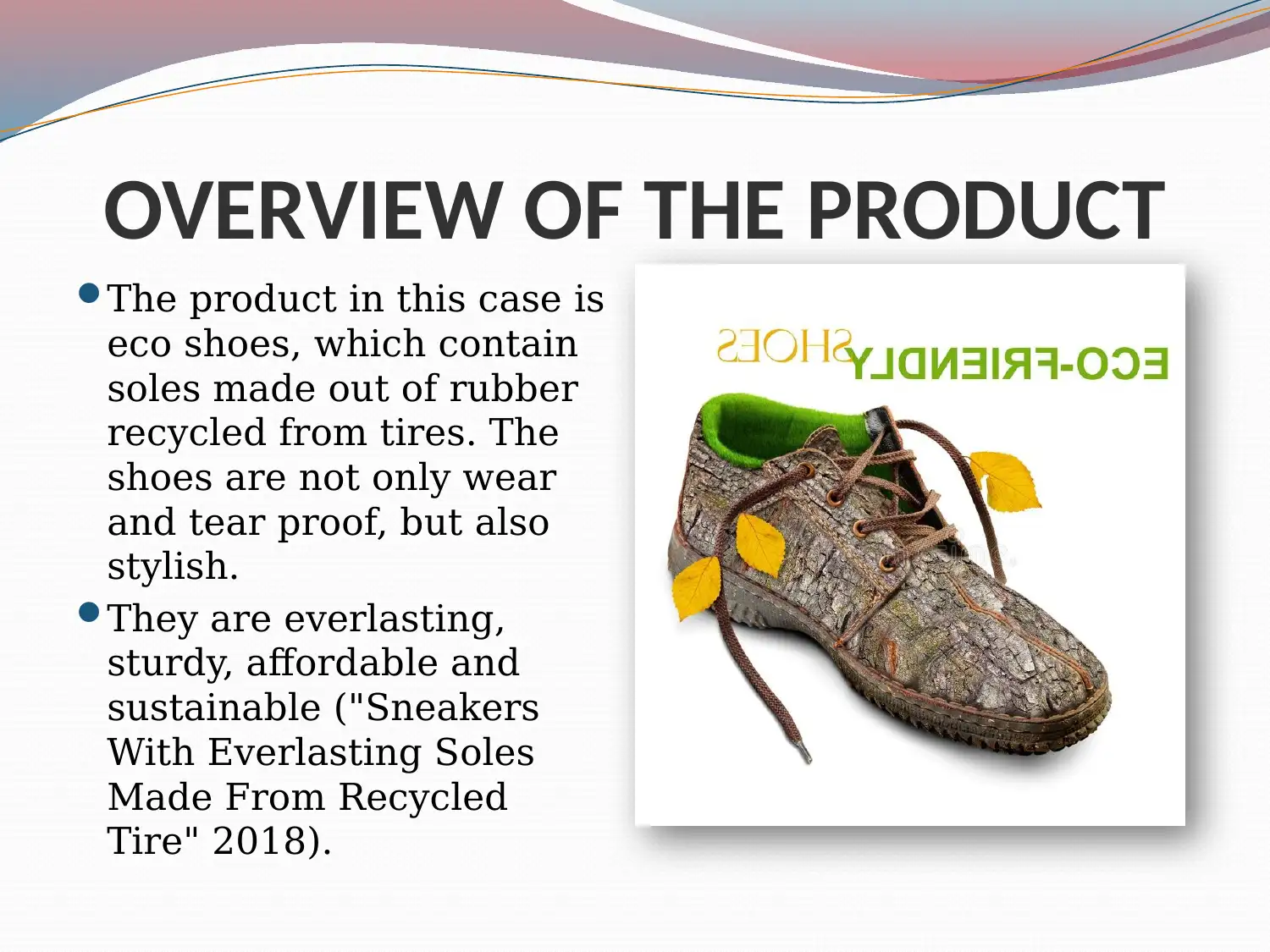
OVERVIEW OF THE PRODUCT
The product in this case is
eco shoes, which contain
soles made out of rubber
recycled from tires. The
shoes are not only wear
and tear proof, but also
stylish.
They are everlasting,
sturdy, affordable and
sustainable ("Sneakers
With Everlasting Soles
Made From Recycled
Tire" 2018).
The product in this case is
eco shoes, which contain
soles made out of rubber
recycled from tires. The
shoes are not only wear
and tear proof, but also
stylish.
They are everlasting,
sturdy, affordable and
sustainable ("Sneakers
With Everlasting Soles
Made From Recycled
Tire" 2018).
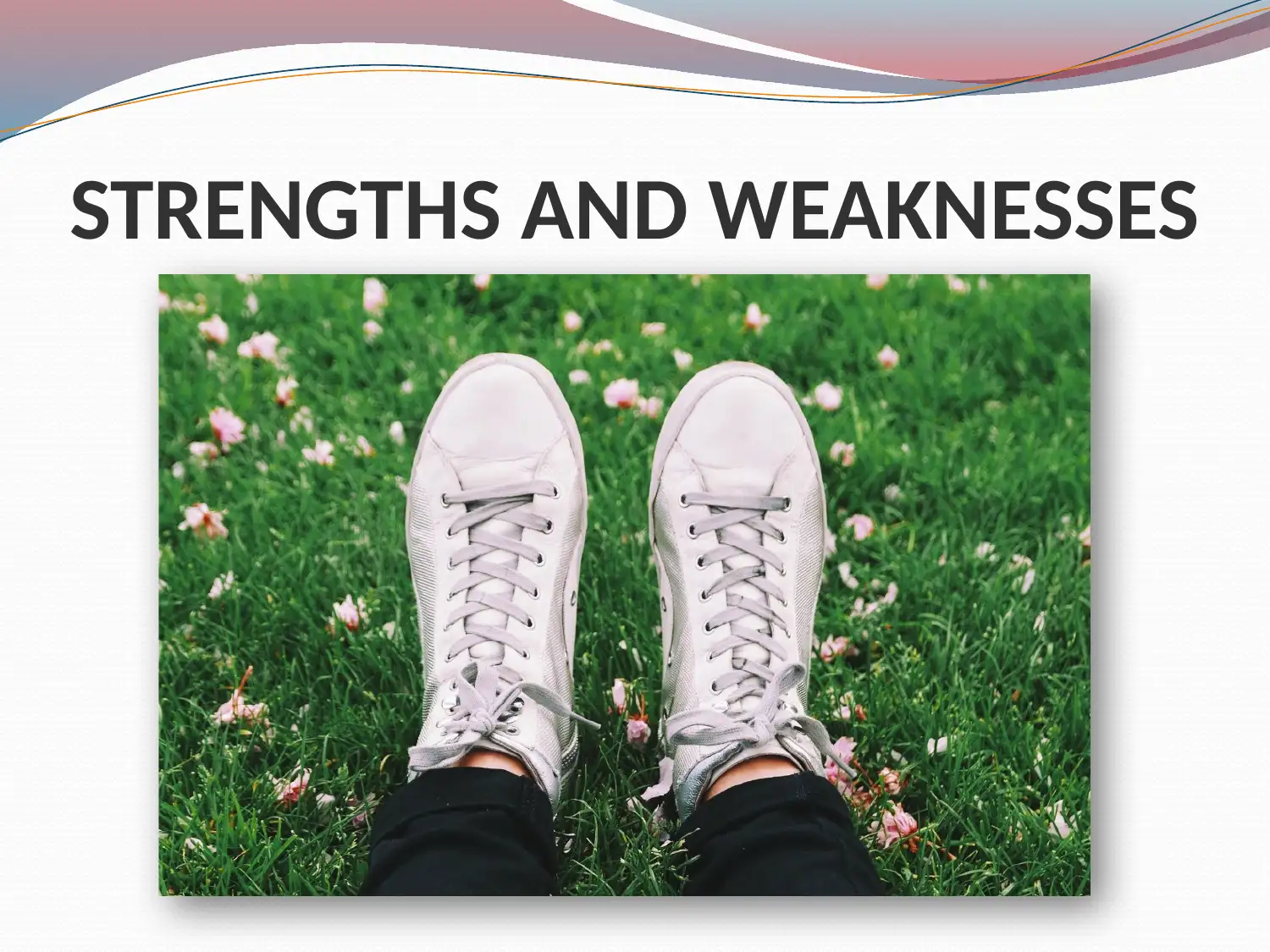
STRENGTHS AND WEAKNESSES
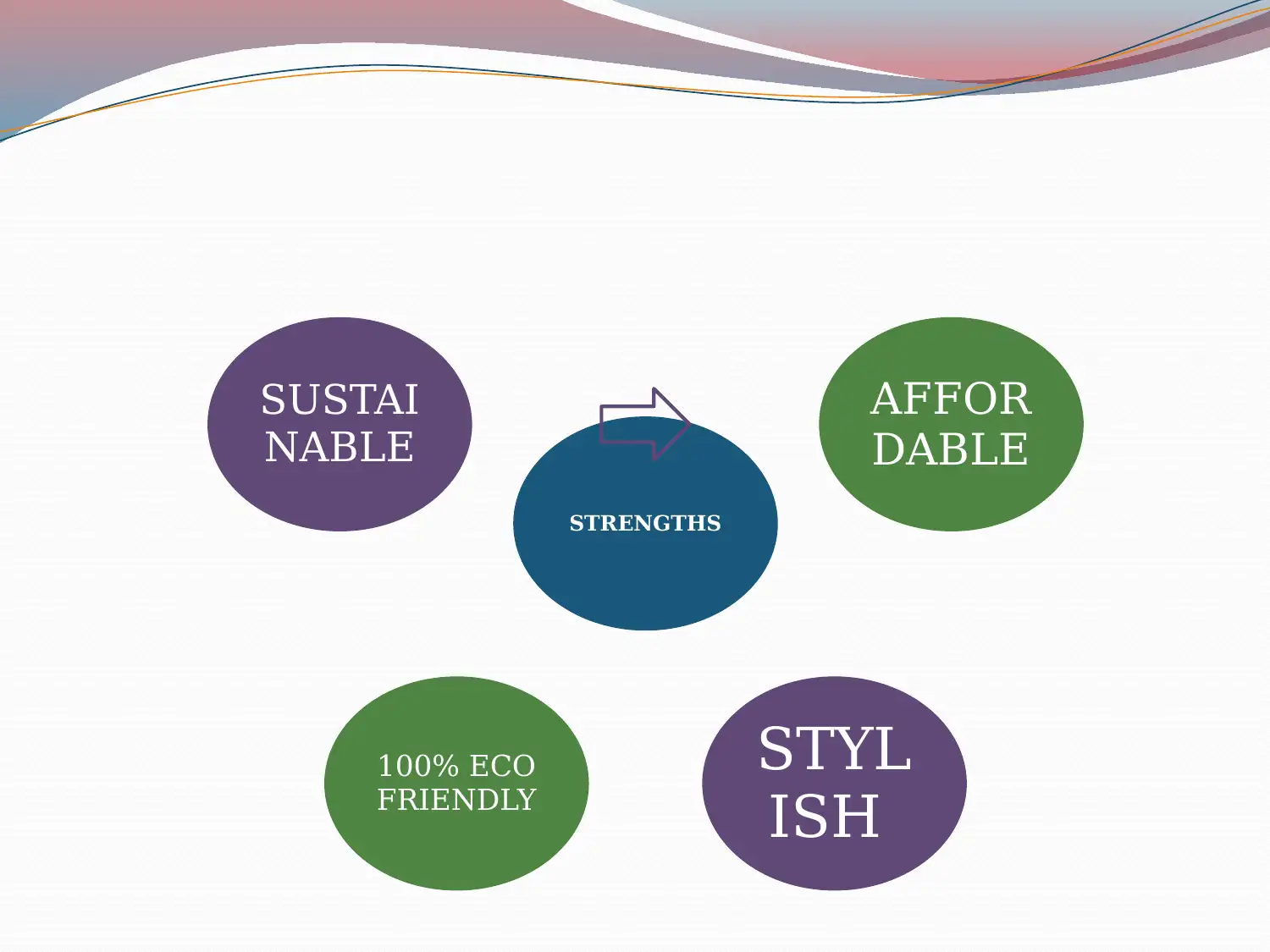
STRENGTHS
AFFOR
DABLE
STYL
ISH
100% ECO
FRIENDLY
SUSTAI
NABLE
AFFOR
DABLE
STYL
ISH
100% ECO
FRIENDLY
SUSTAI
NABLE
Secure Best Marks with AI Grader
Need help grading? Try our AI Grader for instant feedback on your assignments.
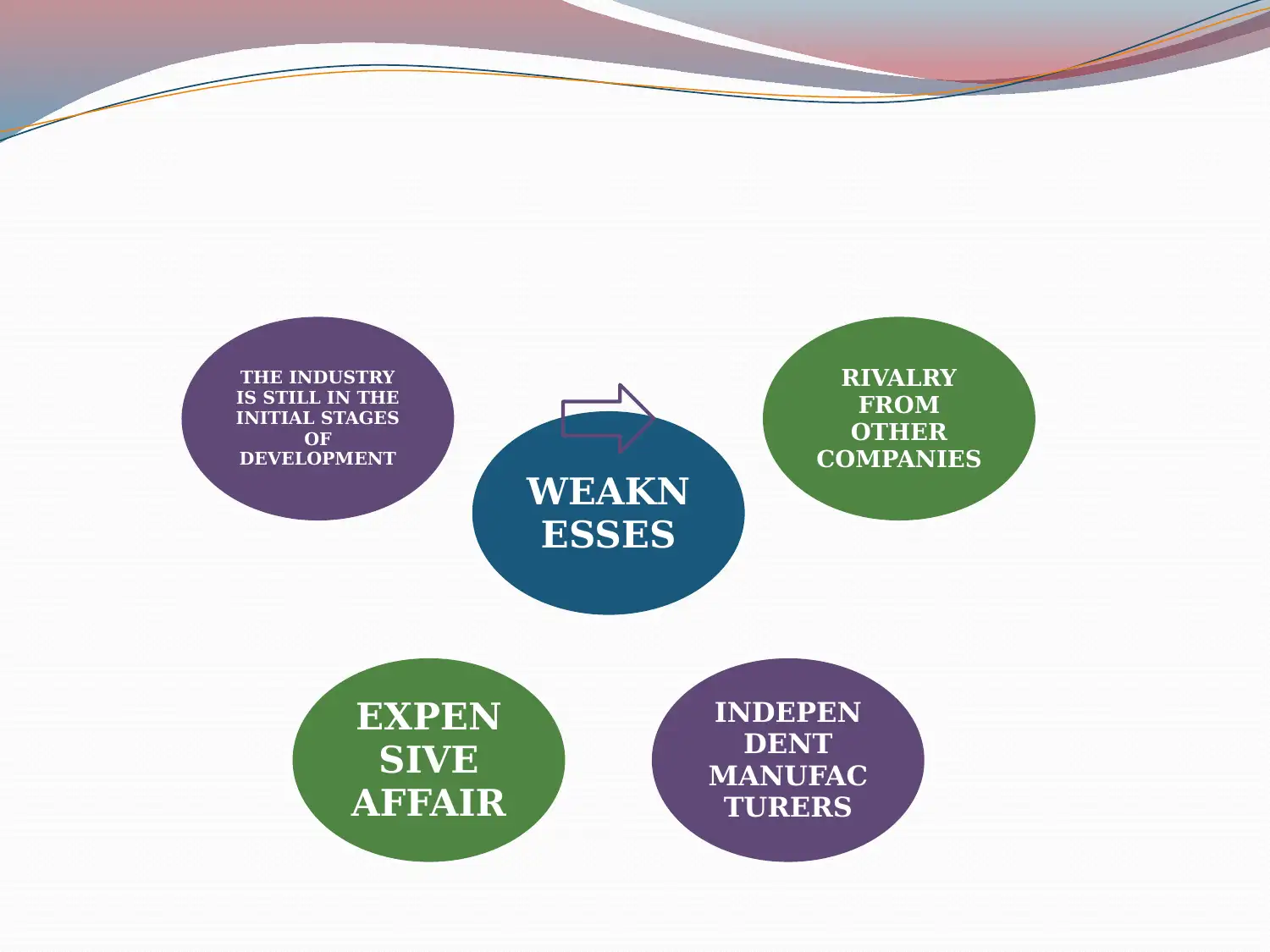
WEAKN
ESSES
RIVALRY
FROM
OTHER
COMPANIES
INDEPEN
DENT
MANUFAC
TURERS
EXPEN
SIVE
AFFAIR
THE INDUSTRY
IS STILL IN THE
INITIAL STAGES
OF
DEVELOPMENT
ESSES
RIVALRY
FROM
OTHER
COMPANIES
INDEPEN
DENT
MANUFAC
TURERS
EXPEN
SIVE
AFFAIR
THE INDUSTRY
IS STILL IN THE
INITIAL STAGES
OF
DEVELOPMENT
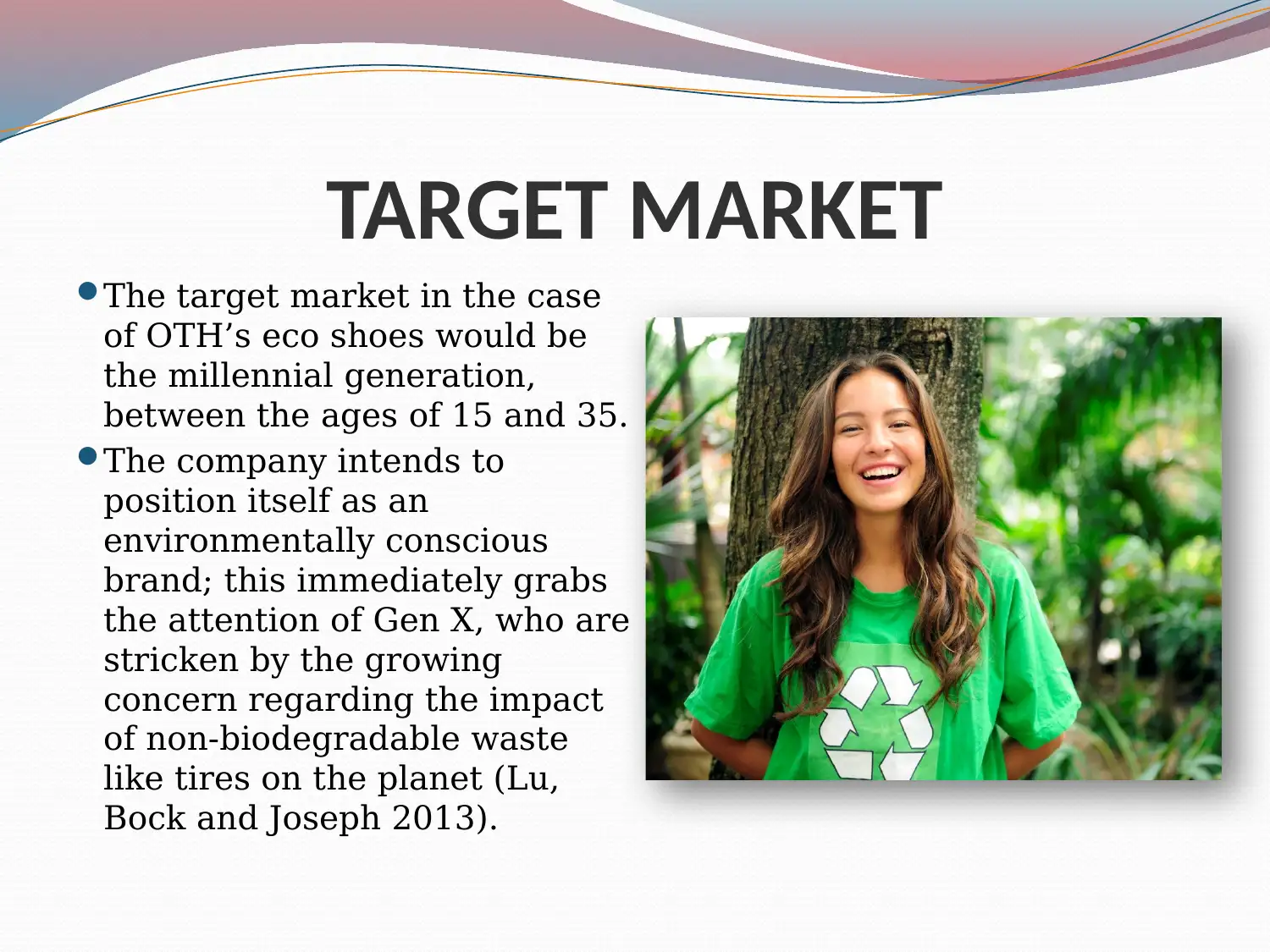
TARGET MARKET
The target market in the case
of OTH’s eco shoes would be
the millennial generation,
between the ages of 15 and 35.
The company intends to
position itself as an
environmentally conscious
brand; this immediately grabs
the attention of Gen X, who are
stricken by the growing
concern regarding the impact
of non-biodegradable waste
like tires on the planet (Lu,
Bock and Joseph 2013).
The target market in the case
of OTH’s eco shoes would be
the millennial generation,
between the ages of 15 and 35.
The company intends to
position itself as an
environmentally conscious
brand; this immediately grabs
the attention of Gen X, who are
stricken by the growing
concern regarding the impact
of non-biodegradable waste
like tires on the planet (Lu,
Bock and Joseph 2013).
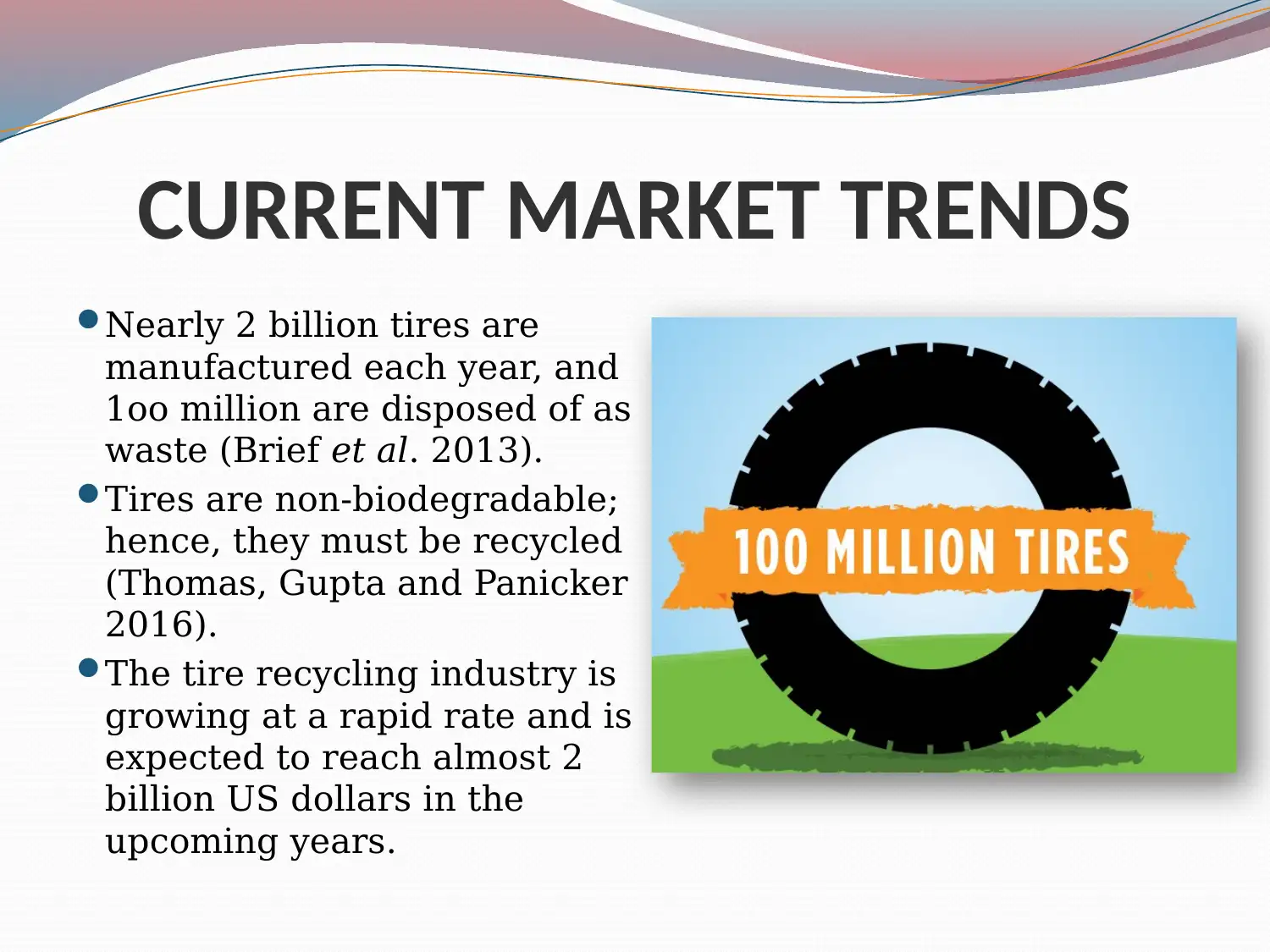
CURRENT MARKET TRENDS
Nearly 2 billion tires are
manufactured each year, and
1oo million are disposed of as
waste (Brief et al. 2013).
Tires are non-biodegradable;
hence, they must be recycled
(Thomas, Gupta and Panicker
2016).
The tire recycling industry is
growing at a rapid rate and is
expected to reach almost 2
billion US dollars in the
upcoming years.
Nearly 2 billion tires are
manufactured each year, and
1oo million are disposed of as
waste (Brief et al. 2013).
Tires are non-biodegradable;
hence, they must be recycled
(Thomas, Gupta and Panicker
2016).
The tire recycling industry is
growing at a rapid rate and is
expected to reach almost 2
billion US dollars in the
upcoming years.
Paraphrase This Document
Need a fresh take? Get an instant paraphrase of this document with our AI Paraphraser

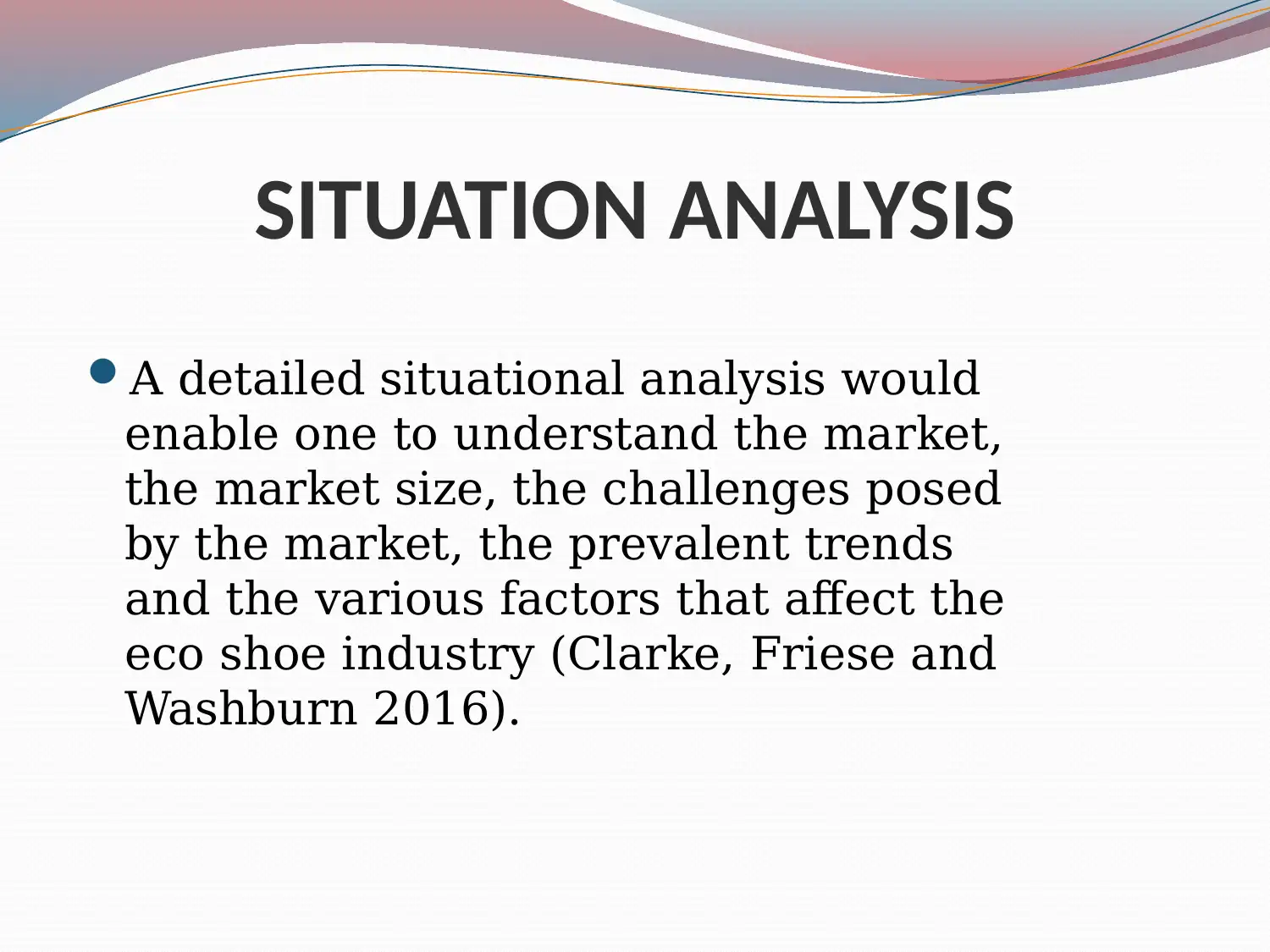
SITUATION ANALYSIS
A detailed situational analysis would
enable one to understand the market,
the market size, the challenges posed
by the market, the prevalent trends
and the various factors that affect the
eco shoe industry (Clarke, Friese and
Washburn 2016).
A detailed situational analysis would
enable one to understand the market,
the market size, the challenges posed
by the market, the prevalent trends
and the various factors that affect the
eco shoe industry (Clarke, Friese and
Washburn 2016).
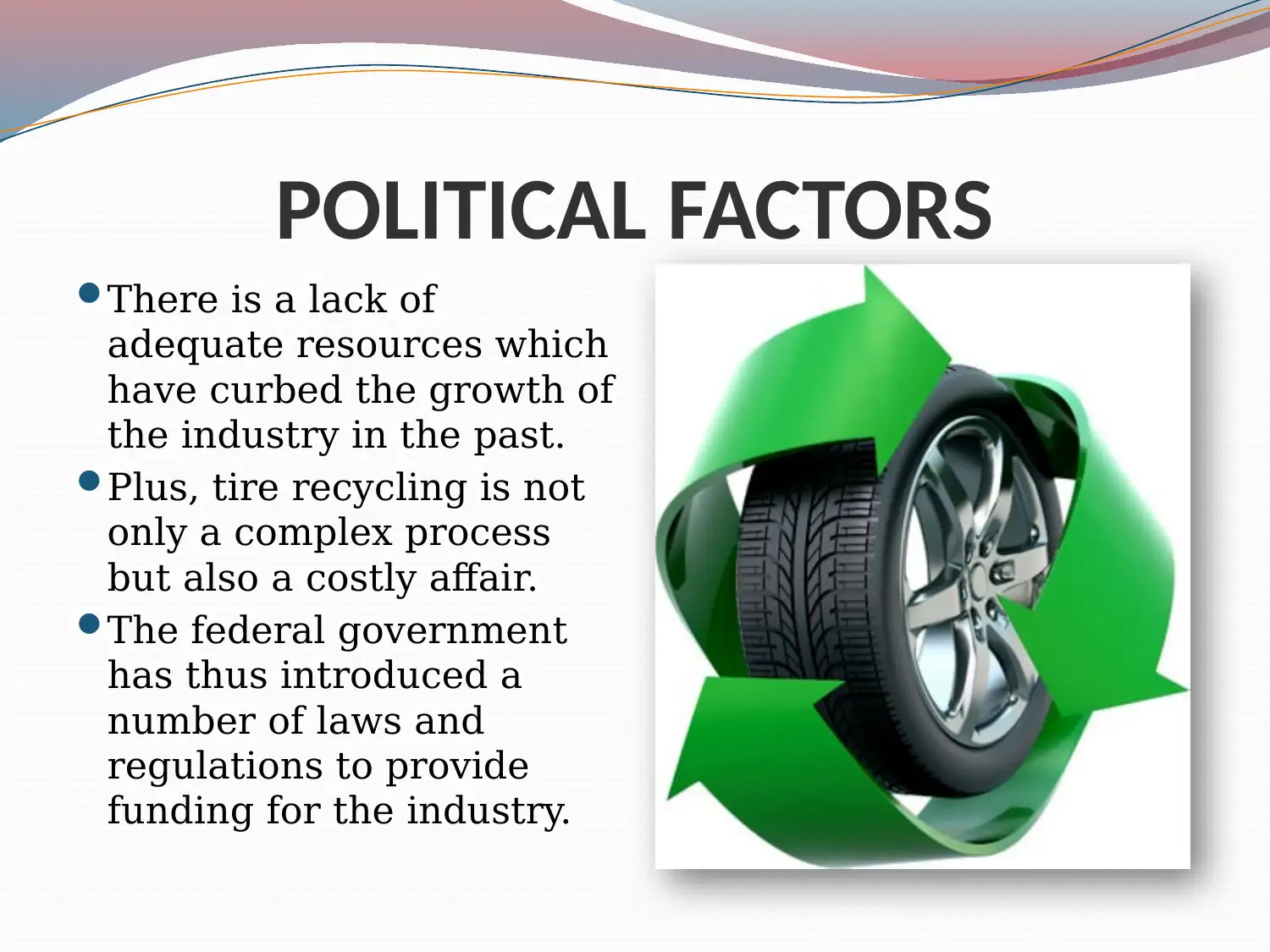
POLITICAL FACTORS
There is a lack of
adequate resources which
have curbed the growth of
the industry in the past.
Plus, tire recycling is not
only a complex process
but also a costly affair.
The federal government
has thus introduced a
number of laws and
regulations to provide
funding for the industry.
There is a lack of
adequate resources which
have curbed the growth of
the industry in the past.
Plus, tire recycling is not
only a complex process
but also a costly affair.
The federal government
has thus introduced a
number of laws and
regulations to provide
funding for the industry.
Secure Best Marks with AI Grader
Need help grading? Try our AI Grader for instant feedback on your assignments.
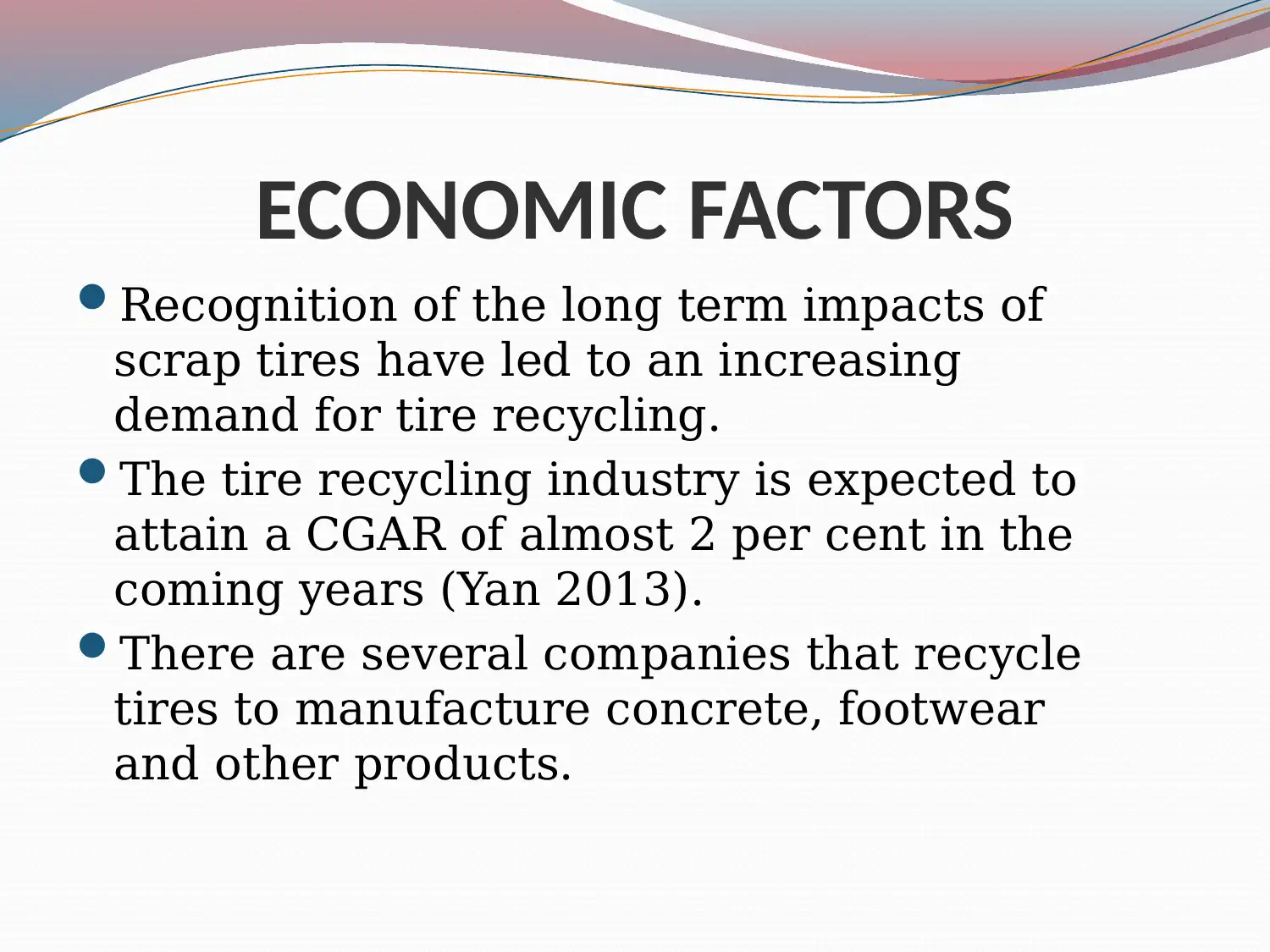
ECONOMIC FACTORS
Recognition of the long term impacts of
scrap tires have led to an increasing
demand for tire recycling.
The tire recycling industry is expected to
attain a CGAR of almost 2 per cent in the
coming years (Yan 2013).
There are several companies that recycle
tires to manufacture concrete, footwear
and other products.
Recognition of the long term impacts of
scrap tires have led to an increasing
demand for tire recycling.
The tire recycling industry is expected to
attain a CGAR of almost 2 per cent in the
coming years (Yan 2013).
There are several companies that recycle
tires to manufacture concrete, footwear
and other products.
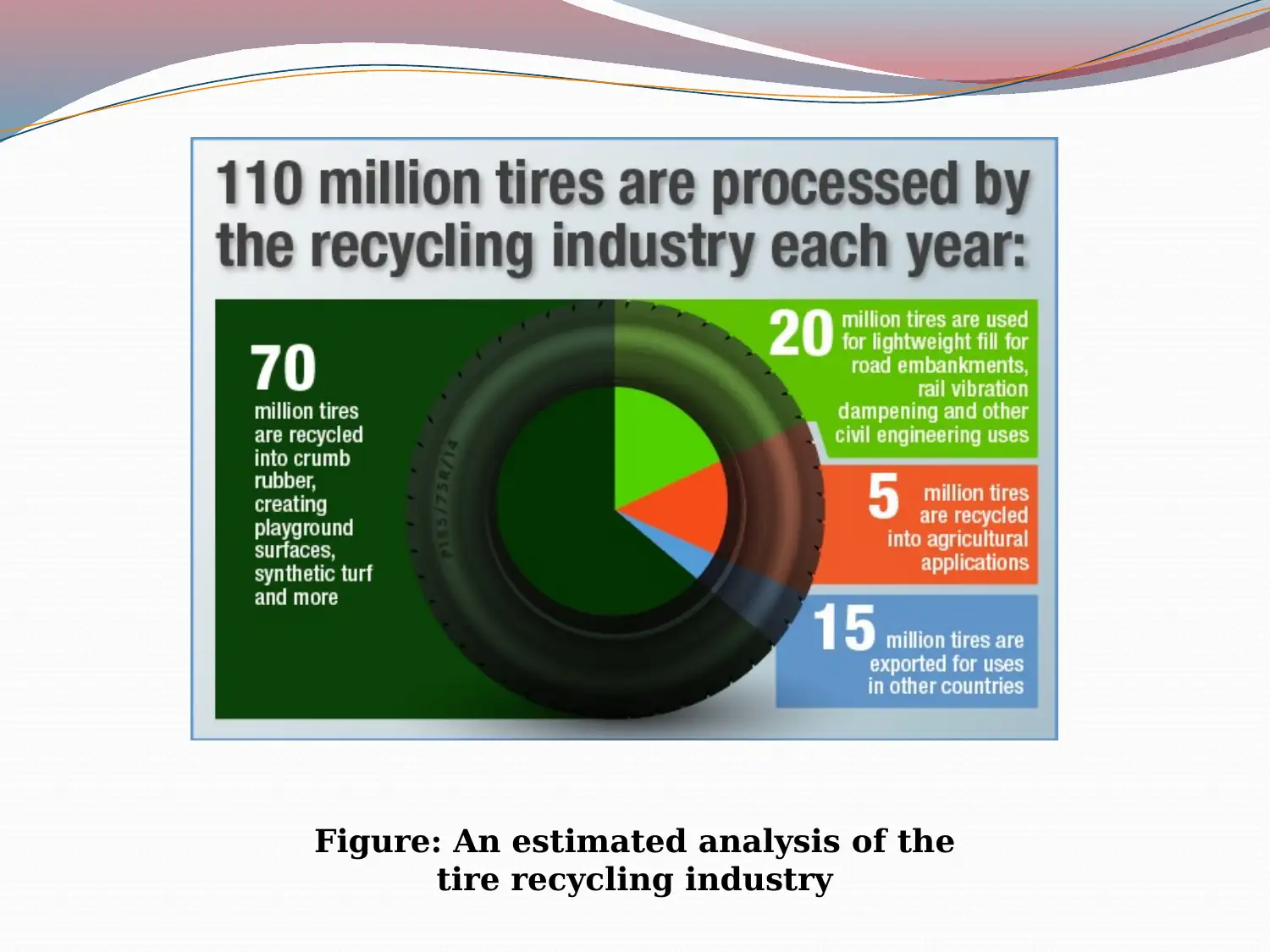
Figure: An estimated analysis of the
tire recycling industry
tire recycling industry
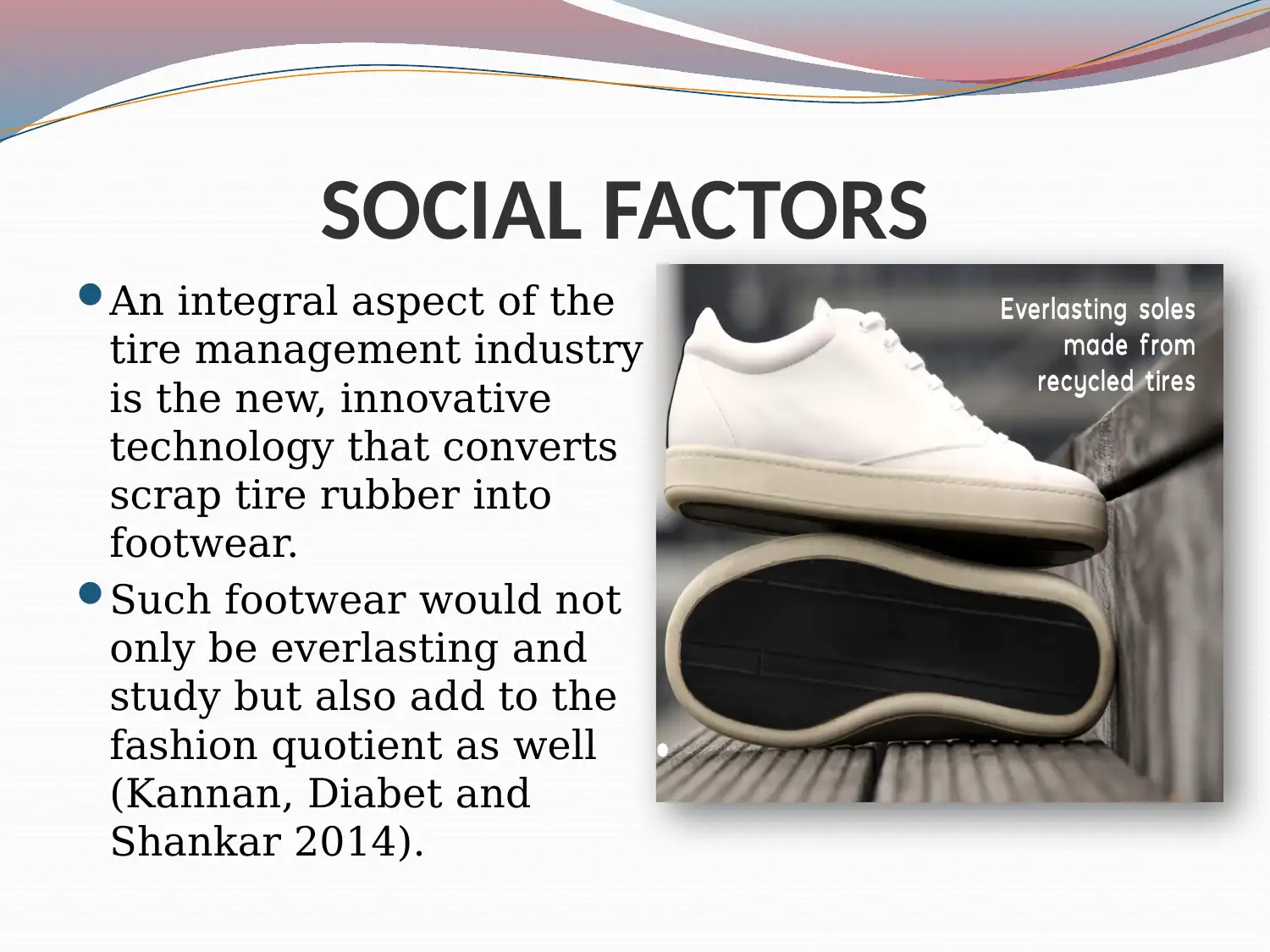
SOCIAL FACTORS
An integral aspect of the
tire management industry
is the new, innovative
technology that converts
scrap tire rubber into
footwear.
Such footwear would not
only be everlasting and
study but also add to the
fashion quotient as well
(Kannan, Diabet and
Shankar 2014).
An integral aspect of the
tire management industry
is the new, innovative
technology that converts
scrap tire rubber into
footwear.
Such footwear would not
only be everlasting and
study but also add to the
fashion quotient as well
(Kannan, Diabet and
Shankar 2014).
Paraphrase This Document
Need a fresh take? Get an instant paraphrase of this document with our AI Paraphraser
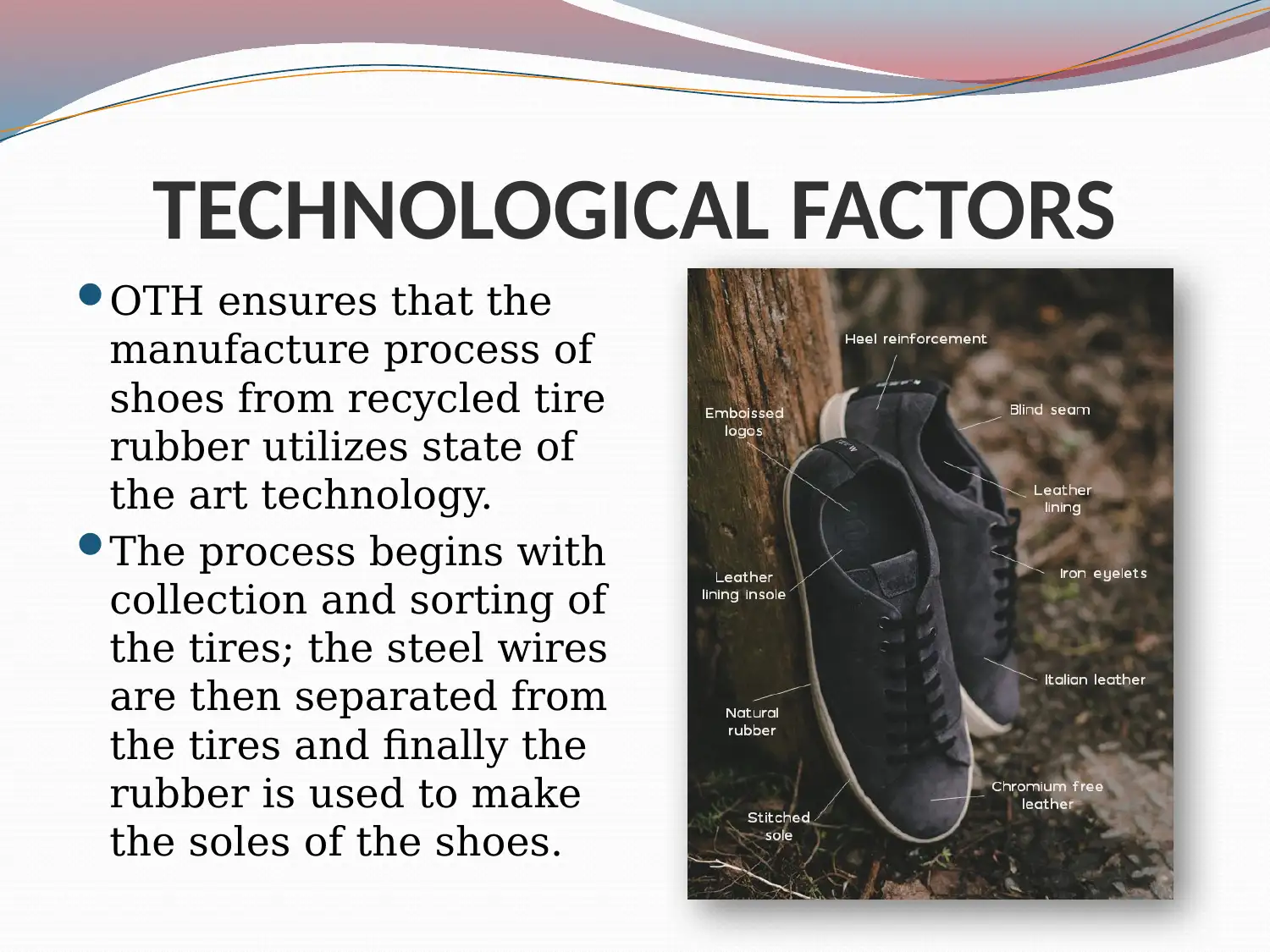
TECHNOLOGICAL FACTORS
OTH ensures that the
manufacture process of
shoes from recycled tire
rubber utilizes state of
the art technology.
The process begins with
collection and sorting of
the tires; the steel wires
are then separated from
the tires and finally the
rubber is used to make
the soles of the shoes.
OTH ensures that the
manufacture process of
shoes from recycled tire
rubber utilizes state of
the art technology.
The process begins with
collection and sorting of
the tires; the steel wires
are then separated from
the tires and finally the
rubber is used to make
the soles of the shoes.
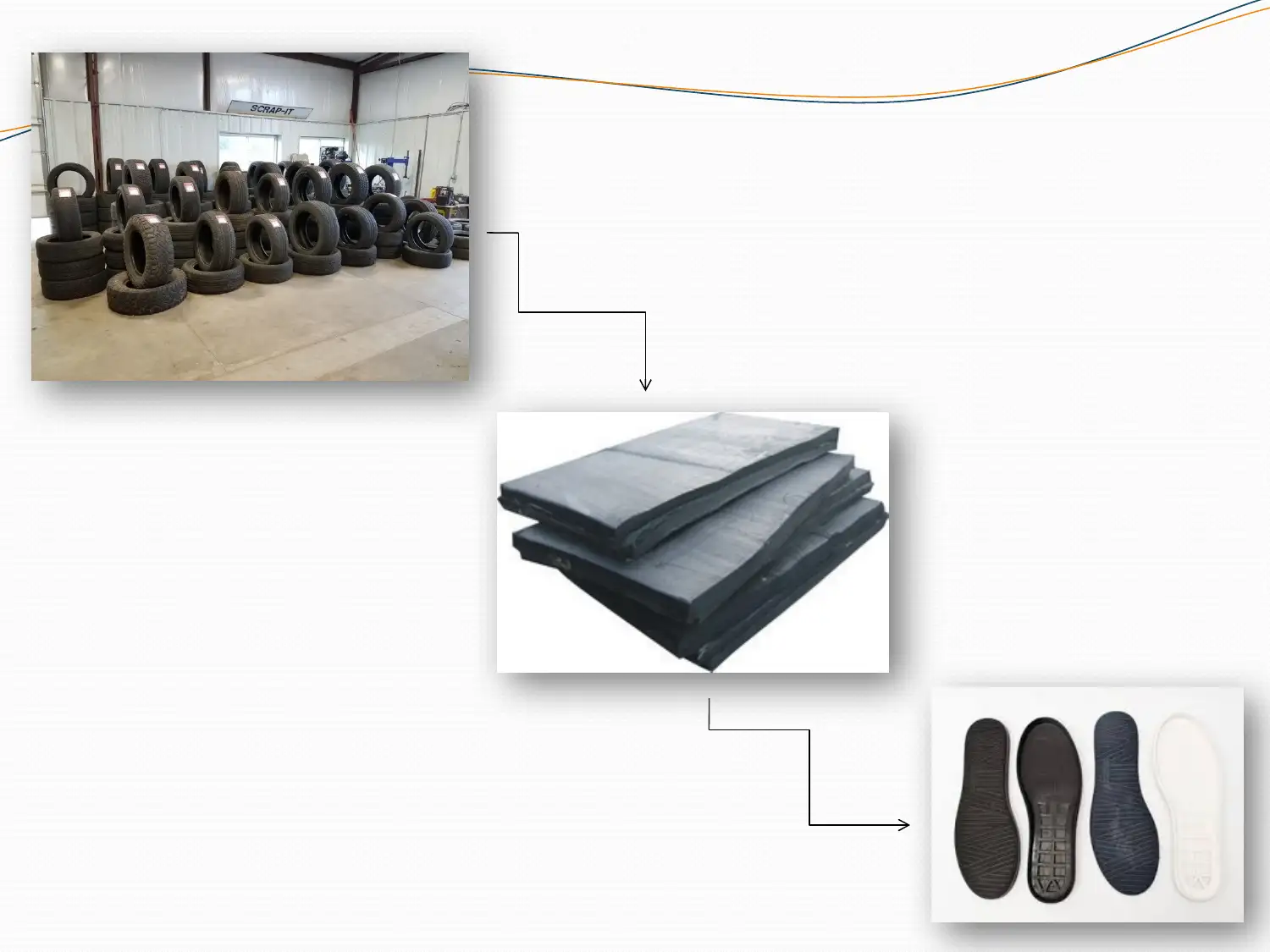
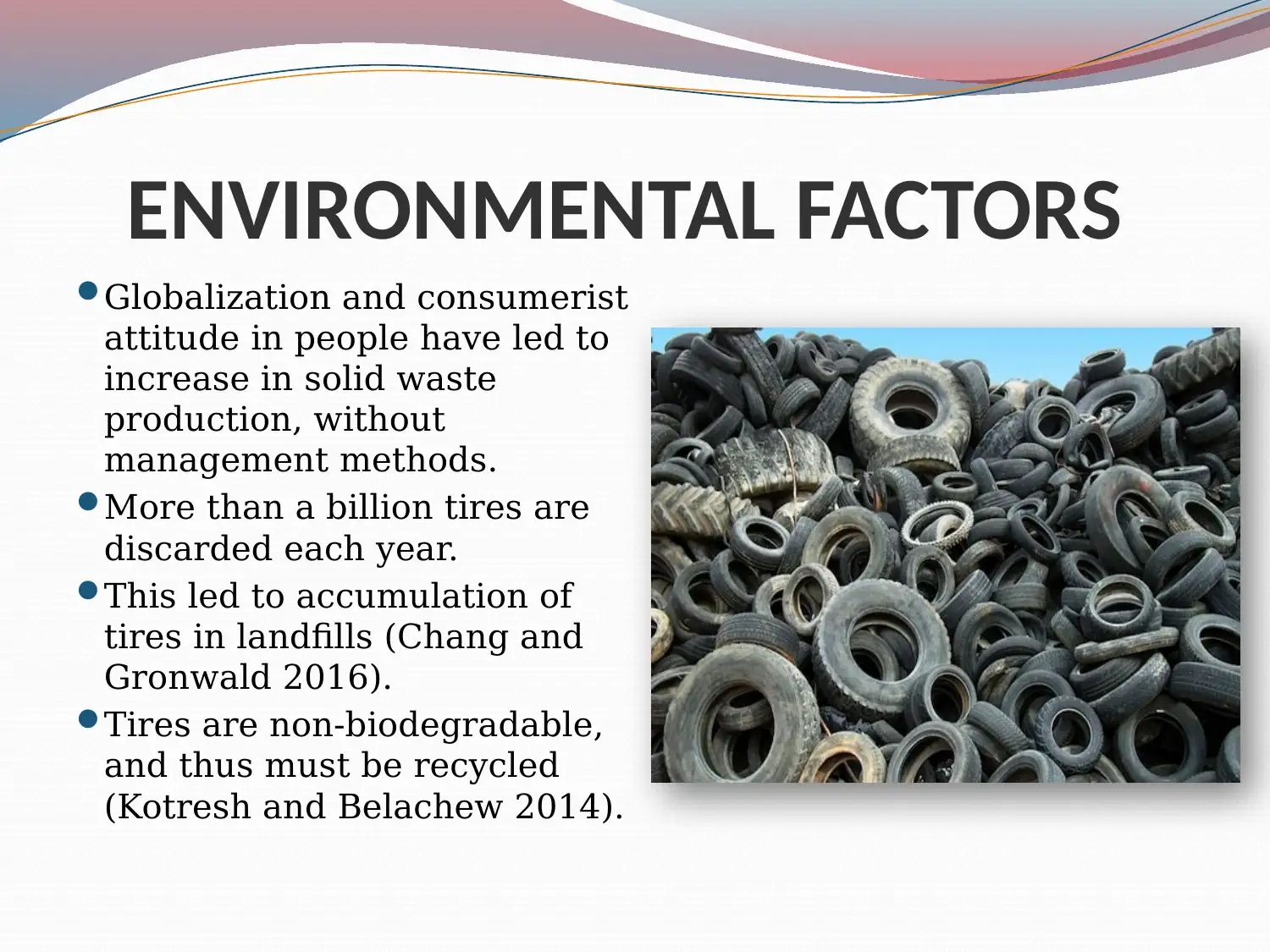
ENVIRONMENTAL FACTORS
Globalization and consumerist
attitude in people have led to
increase in solid waste
production, without
management methods.
More than a billion tires are
discarded each year.
This led to accumulation of
tires in landfills (Chang and
Gronwald 2016).
Tires are non-biodegradable,
and thus must be recycled
(Kotresh and Belachew 2014).
Globalization and consumerist
attitude in people have led to
increase in solid waste
production, without
management methods.
More than a billion tires are
discarded each year.
This led to accumulation of
tires in landfills (Chang and
Gronwald 2016).
Tires are non-biodegradable,
and thus must be recycled
(Kotresh and Belachew 2014).
Secure Best Marks with AI Grader
Need help grading? Try our AI Grader for instant feedback on your assignments.
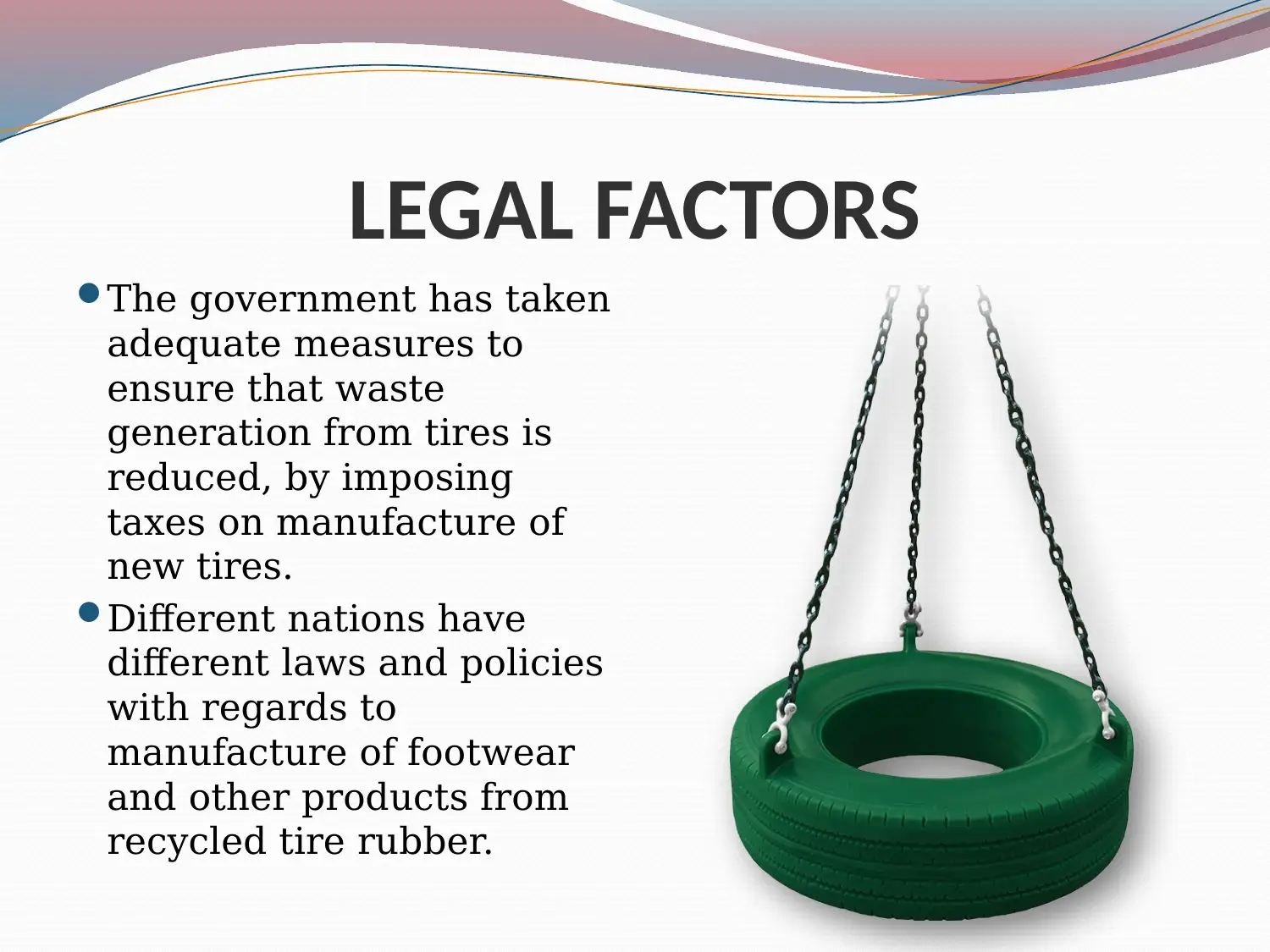
LEGAL FACTORS
The government has taken
adequate measures to
ensure that waste
generation from tires is
reduced, by imposing
taxes on manufacture of
new tires.
Different nations have
different laws and policies
with regards to
manufacture of footwear
and other products from
recycled tire rubber.
The government has taken
adequate measures to
ensure that waste
generation from tires is
reduced, by imposing
taxes on manufacture of
new tires.
Different nations have
different laws and policies
with regards to
manufacture of footwear
and other products from
recycled tire rubber.
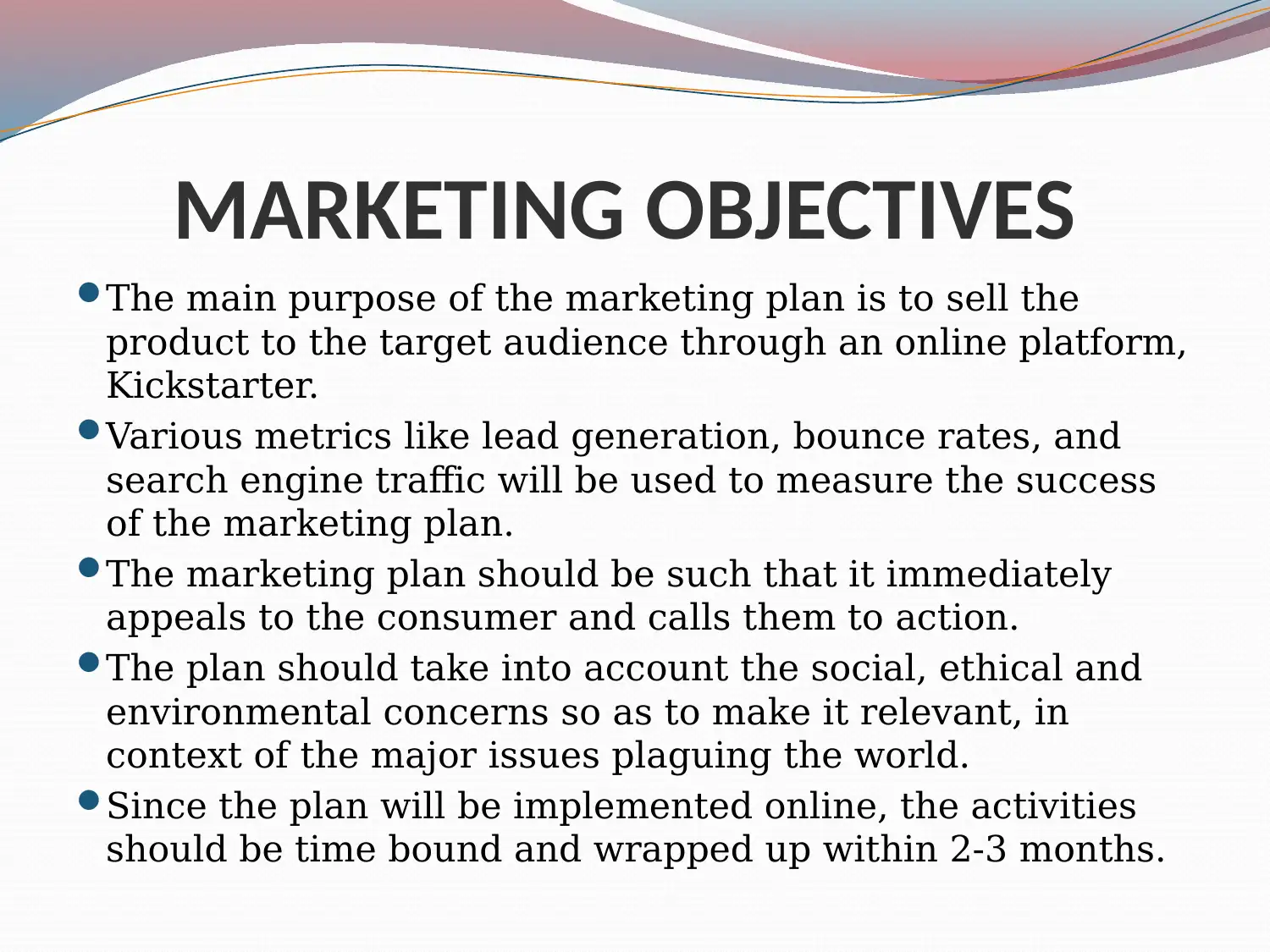
MARKETING OBJECTIVES
The main purpose of the marketing plan is to sell the
product to the target audience through an online platform,
Kickstarter.
Various metrics like lead generation, bounce rates, and
search engine traffic will be used to measure the success
of the marketing plan.
The marketing plan should be such that it immediately
appeals to the consumer and calls them to action.
The plan should take into account the social, ethical and
environmental concerns so as to make it relevant, in
context of the major issues plaguing the world.
Since the plan will be implemented online, the activities
should be time bound and wrapped up within 2-3 months.
The main purpose of the marketing plan is to sell the
product to the target audience through an online platform,
Kickstarter.
Various metrics like lead generation, bounce rates, and
search engine traffic will be used to measure the success
of the marketing plan.
The marketing plan should be such that it immediately
appeals to the consumer and calls them to action.
The plan should take into account the social, ethical and
environmental concerns so as to make it relevant, in
context of the major issues plaguing the world.
Since the plan will be implemented online, the activities
should be time bound and wrapped up within 2-3 months.
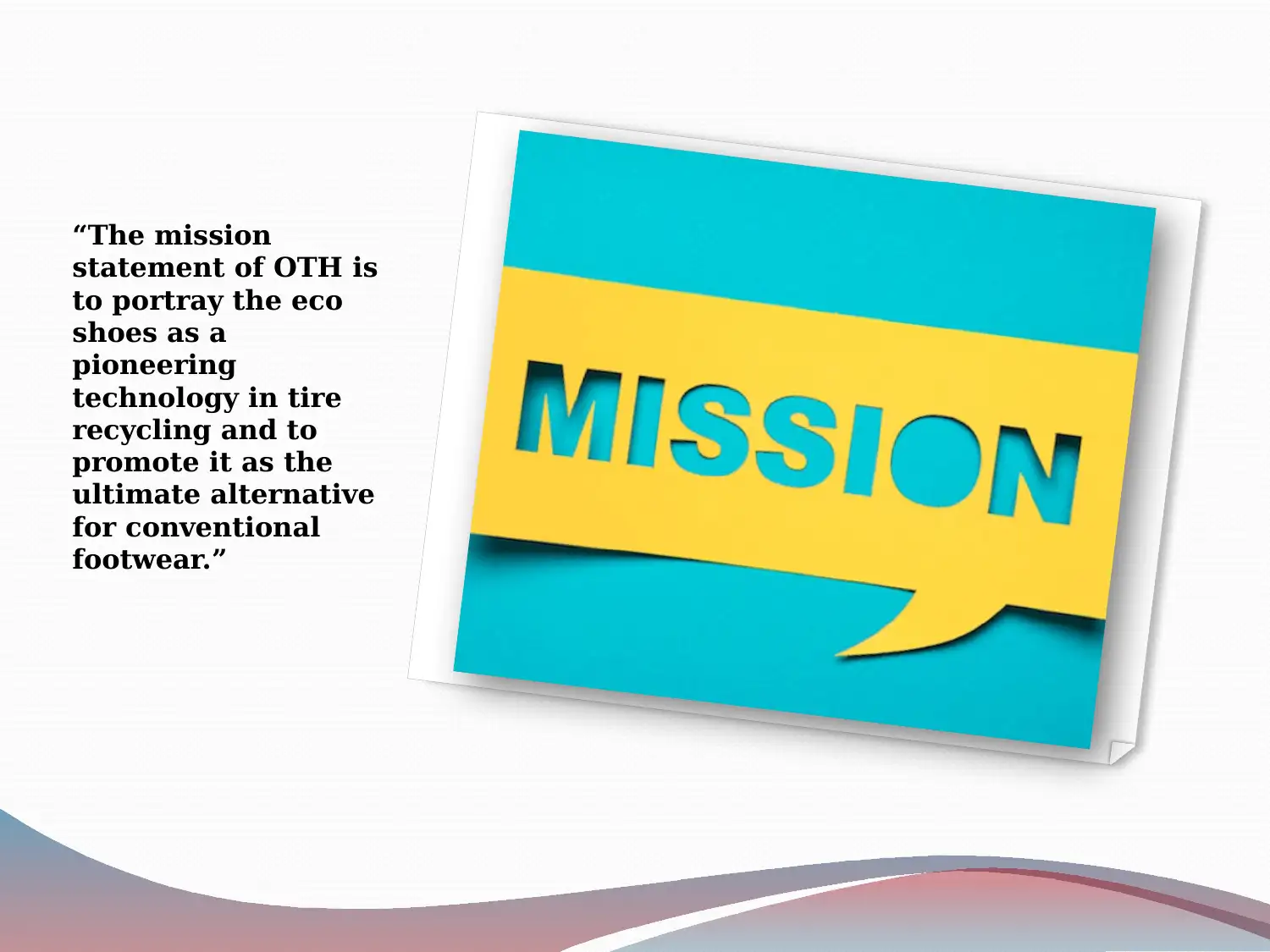
“The mission
statement of OTH is
to portray the eco
shoes as a
pioneering
technology in tire
recycling and to
promote it as the
ultimate alternative
for conventional
footwear.”
statement of OTH is
to portray the eco
shoes as a
pioneering
technology in tire
recycling and to
promote it as the
ultimate alternative
for conventional
footwear.”
Paraphrase This Document
Need a fresh take? Get an instant paraphrase of this document with our AI Paraphraser
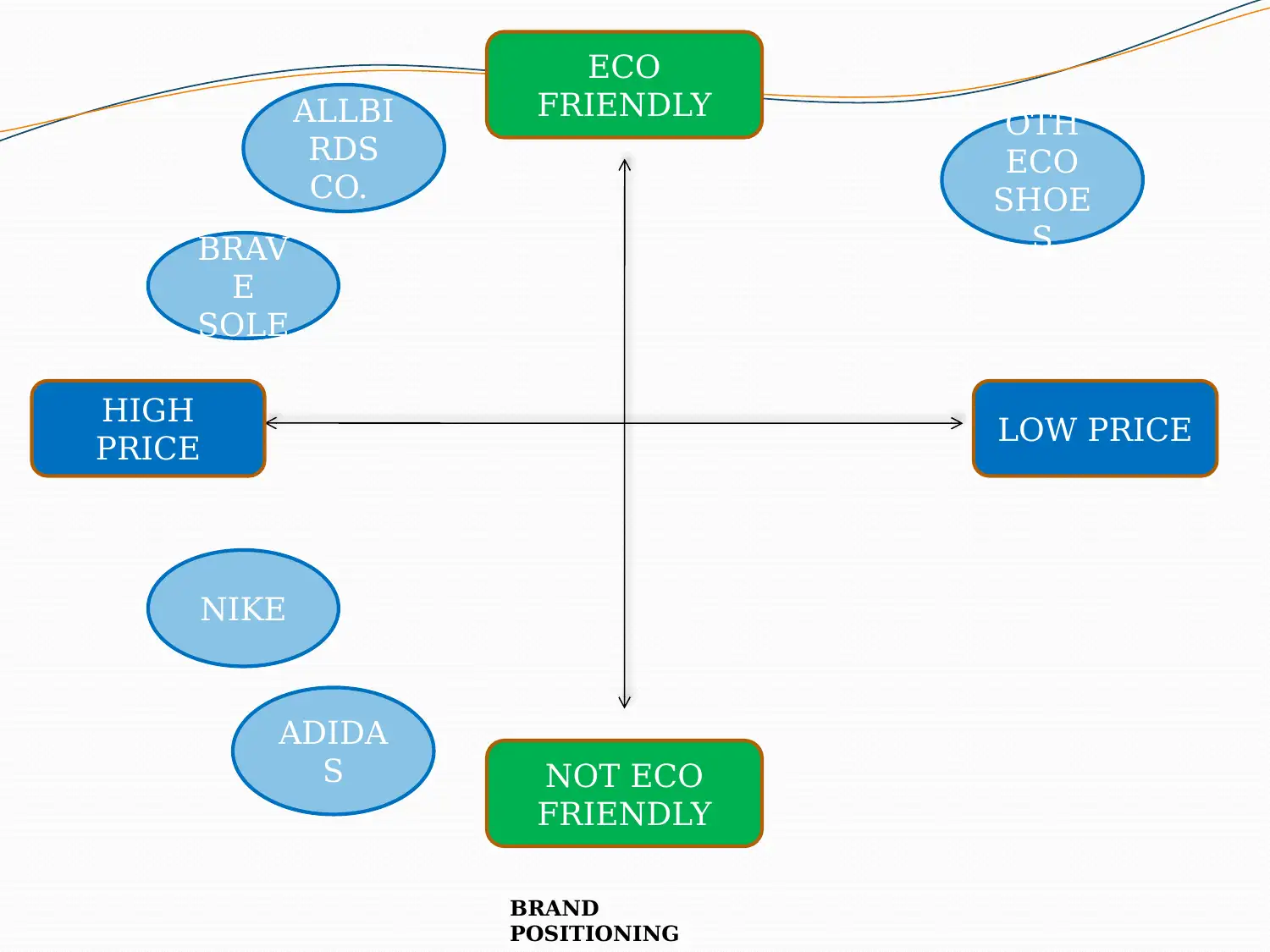
ECO
FRIENDLY
NOT ECO
FRIENDLY
HIGH
PRICE LOW PRICE
OTH
ECO
SHOE
S
ALLBI
RDS
CO.
BRAV
E
SOLE
NIKE
ADIDA
S
BRAND
POSITIONING
FRIENDLY
NOT ECO
FRIENDLY
HIGH
PRICE LOW PRICE
OTH
ECO
SHOE
S
ALLBI
RDS
CO.
BRAV
E
SOLE
NIKE
ADIDA
S
BRAND
POSITIONING
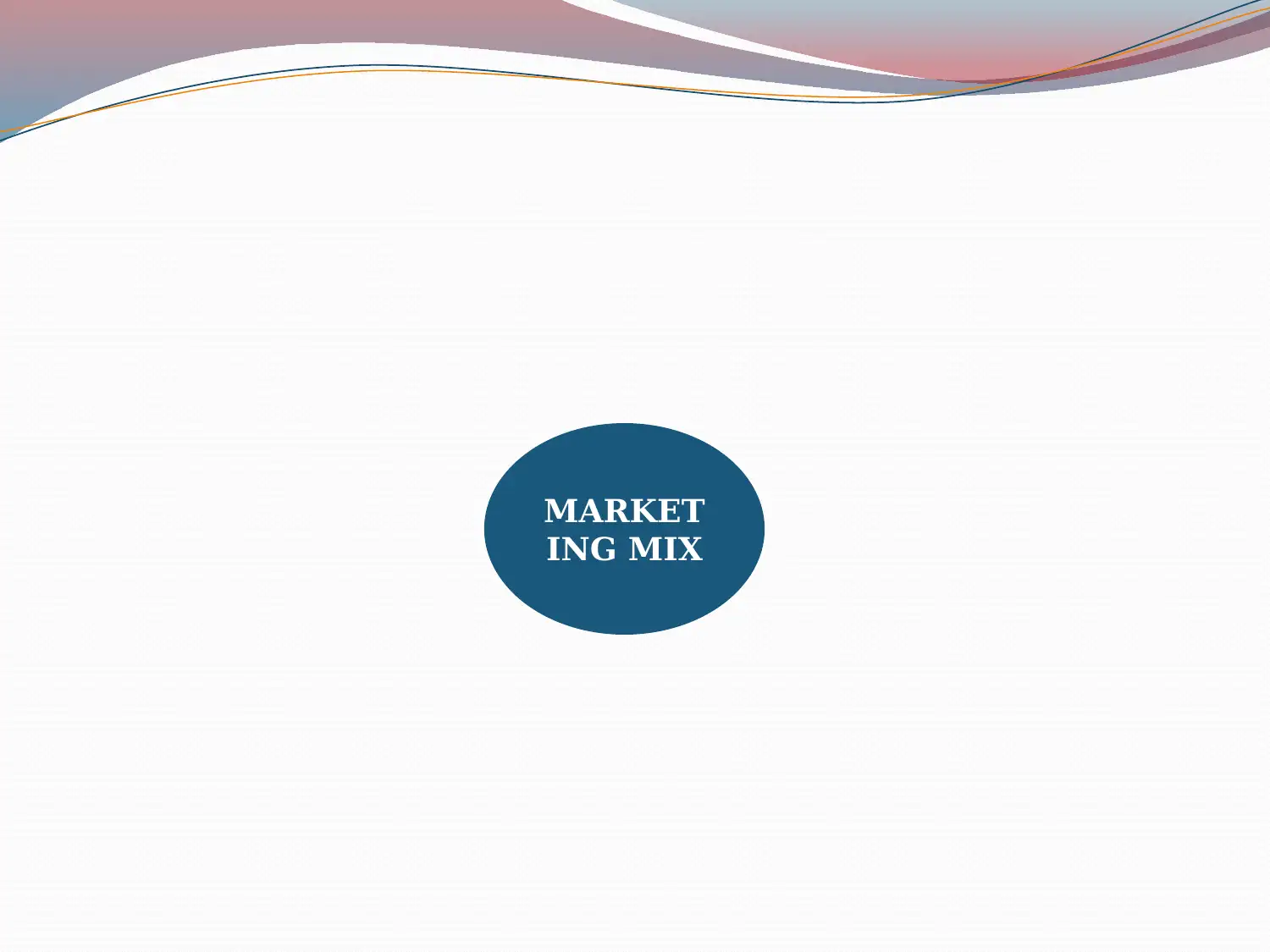
MARKET
ING MIX
ING MIX
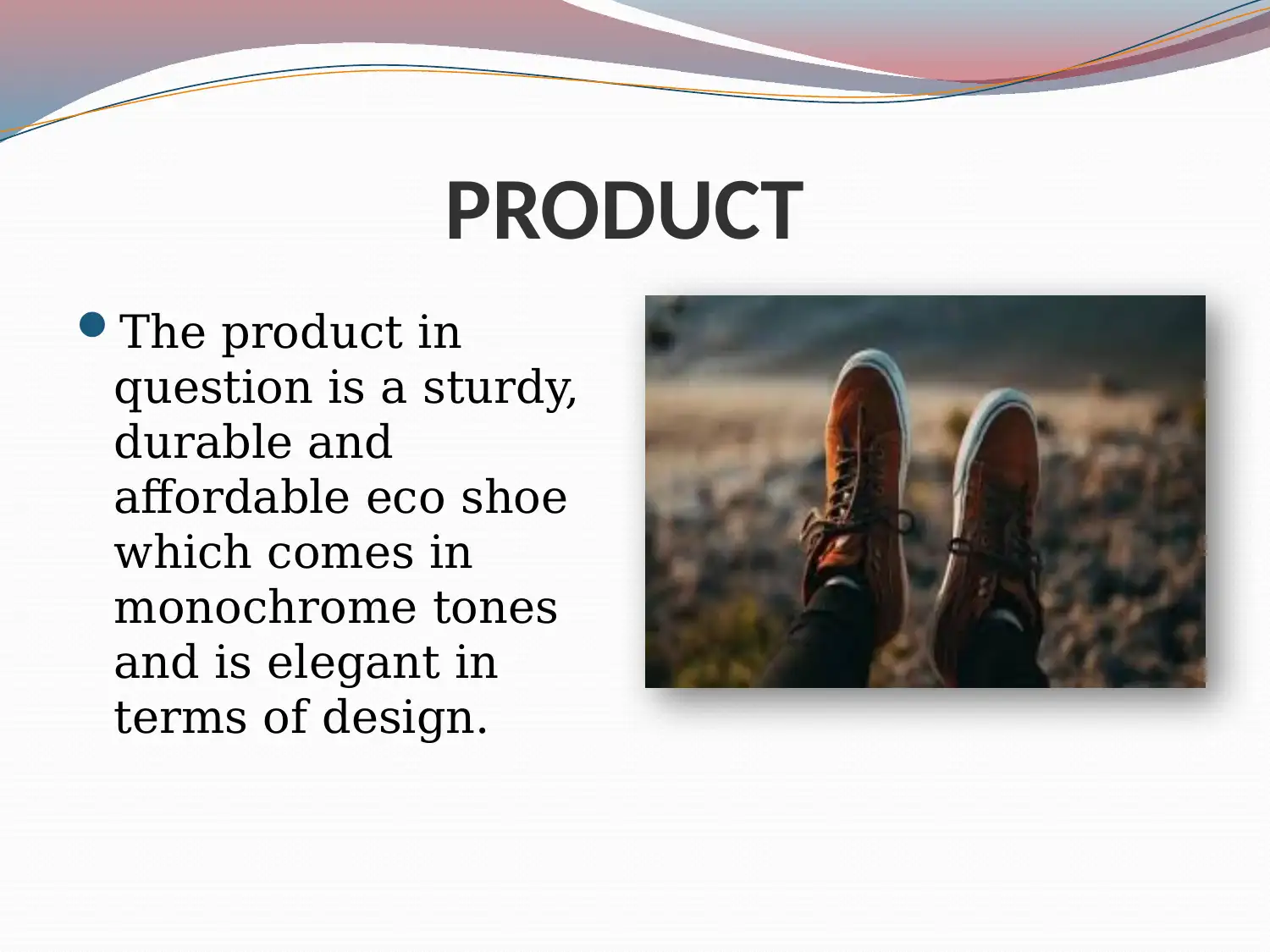
PRODUCT
The product in
question is a sturdy,
durable and
affordable eco shoe
which comes in
monochrome tones
and is elegant in
terms of design.
The product in
question is a sturdy,
durable and
affordable eco shoe
which comes in
monochrome tones
and is elegant in
terms of design.
Secure Best Marks with AI Grader
Need help grading? Try our AI Grader for instant feedback on your assignments.
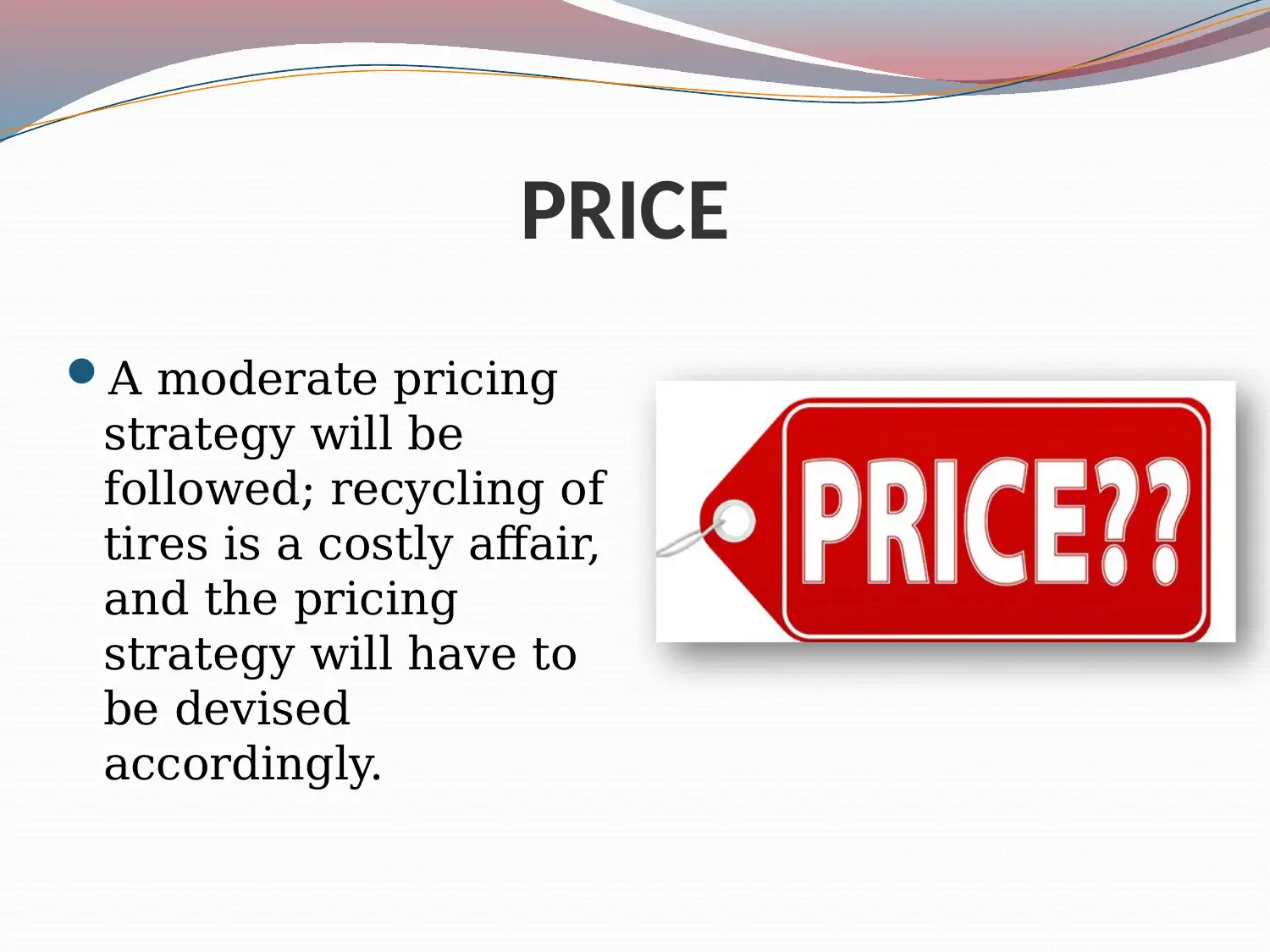
PRICE
A moderate pricing
strategy will be
followed; recycling of
tires is a costly affair,
and the pricing
strategy will have to
be devised
accordingly.
A moderate pricing
strategy will be
followed; recycling of
tires is a costly affair,
and the pricing
strategy will have to
be devised
accordingly.
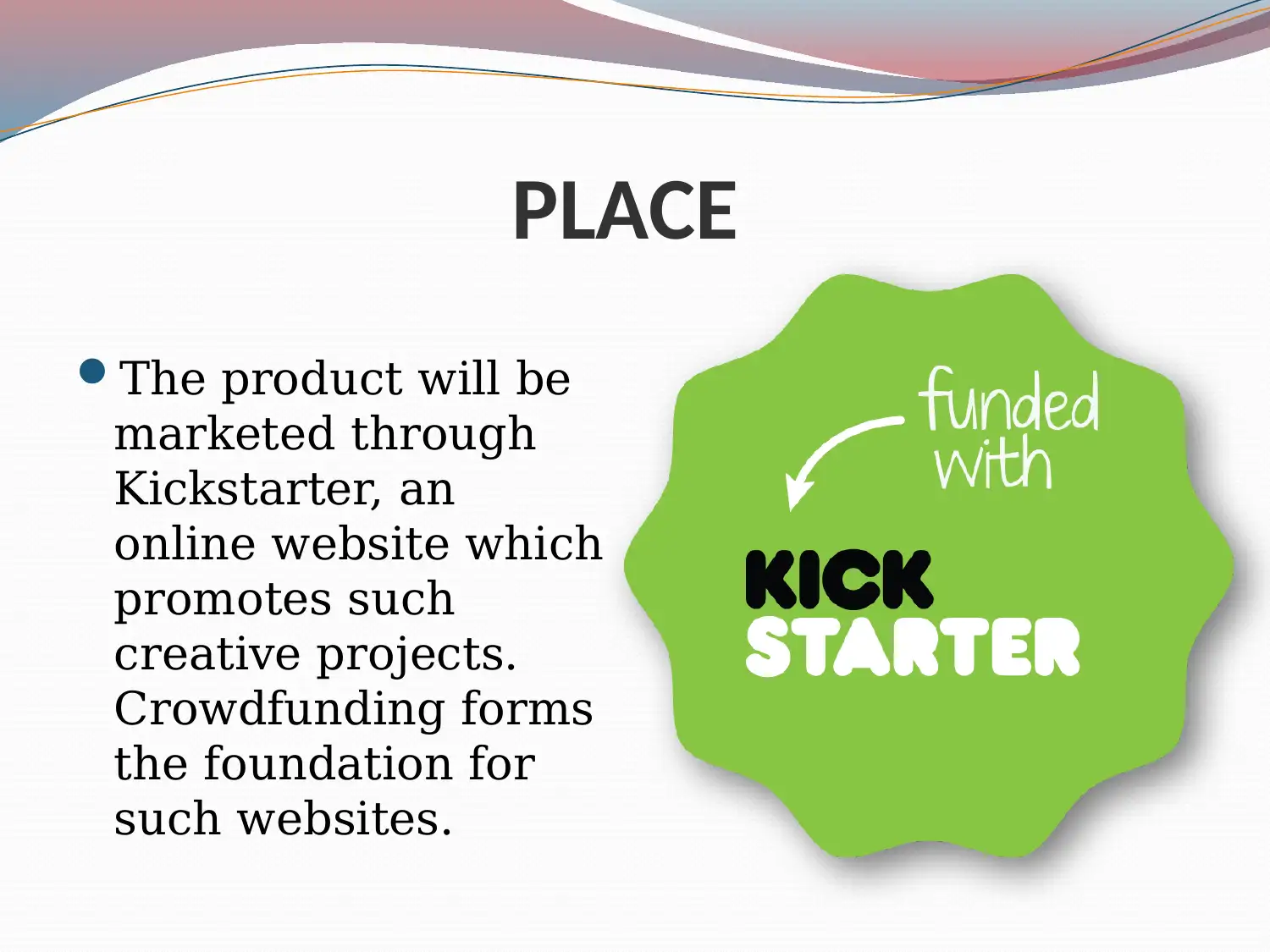
PLACE
The product will be
marketed through
Kickstarter, an
online website which
promotes such
creative projects.
Crowdfunding forms
the foundation for
such websites.
The product will be
marketed through
Kickstarter, an
online website which
promotes such
creative projects.
Crowdfunding forms
the foundation for
such websites.
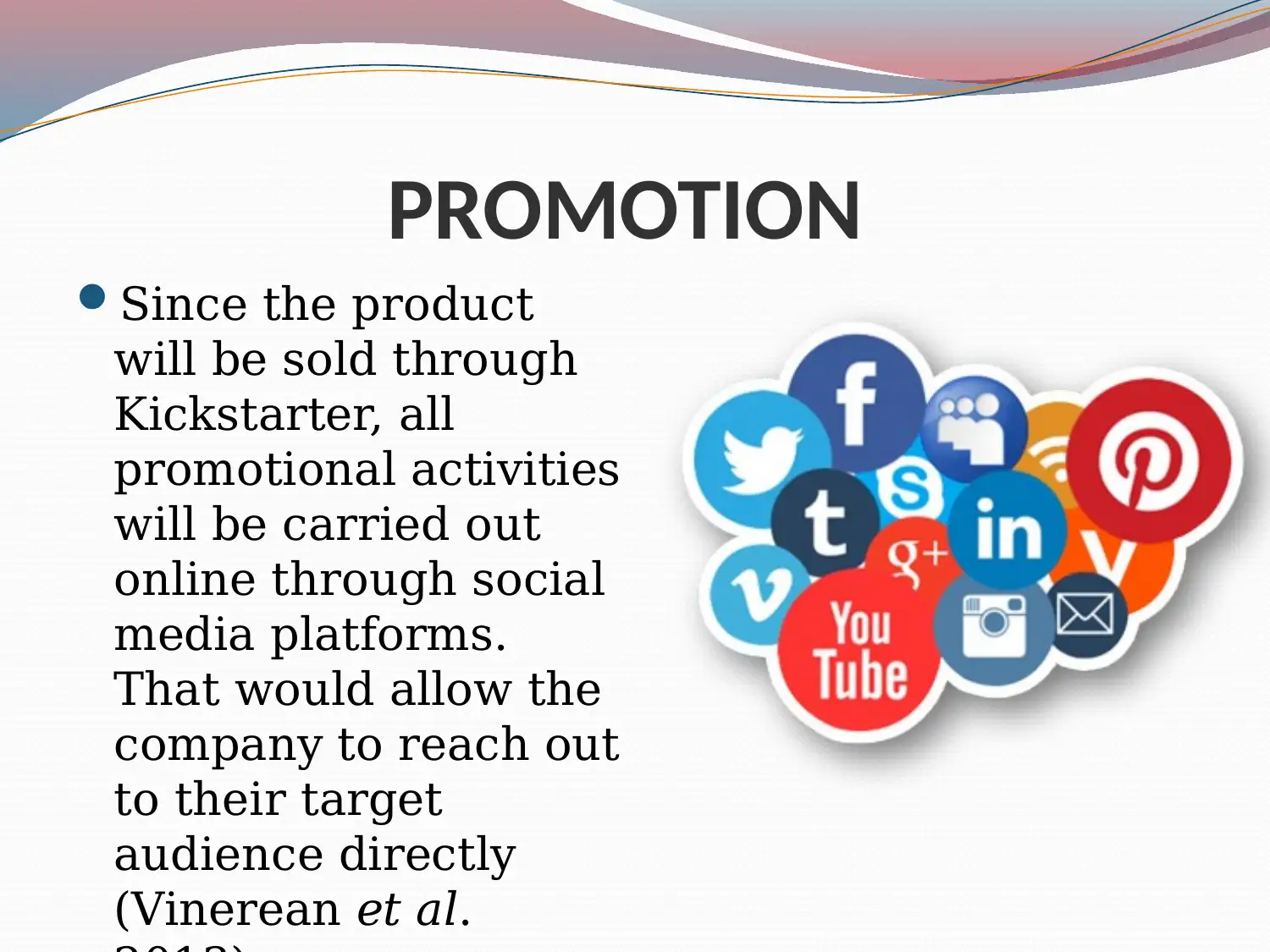
PROMOTION
Since the product
will be sold through
Kickstarter, all
promotional activities
will be carried out
online through social
media platforms.
That would allow the
company to reach out
to their target
audience directly
(Vinerean et al.
Since the product
will be sold through
Kickstarter, all
promotional activities
will be carried out
online through social
media platforms.
That would allow the
company to reach out
to their target
audience directly
(Vinerean et al.
Paraphrase This Document
Need a fresh take? Get an instant paraphrase of this document with our AI Paraphraser
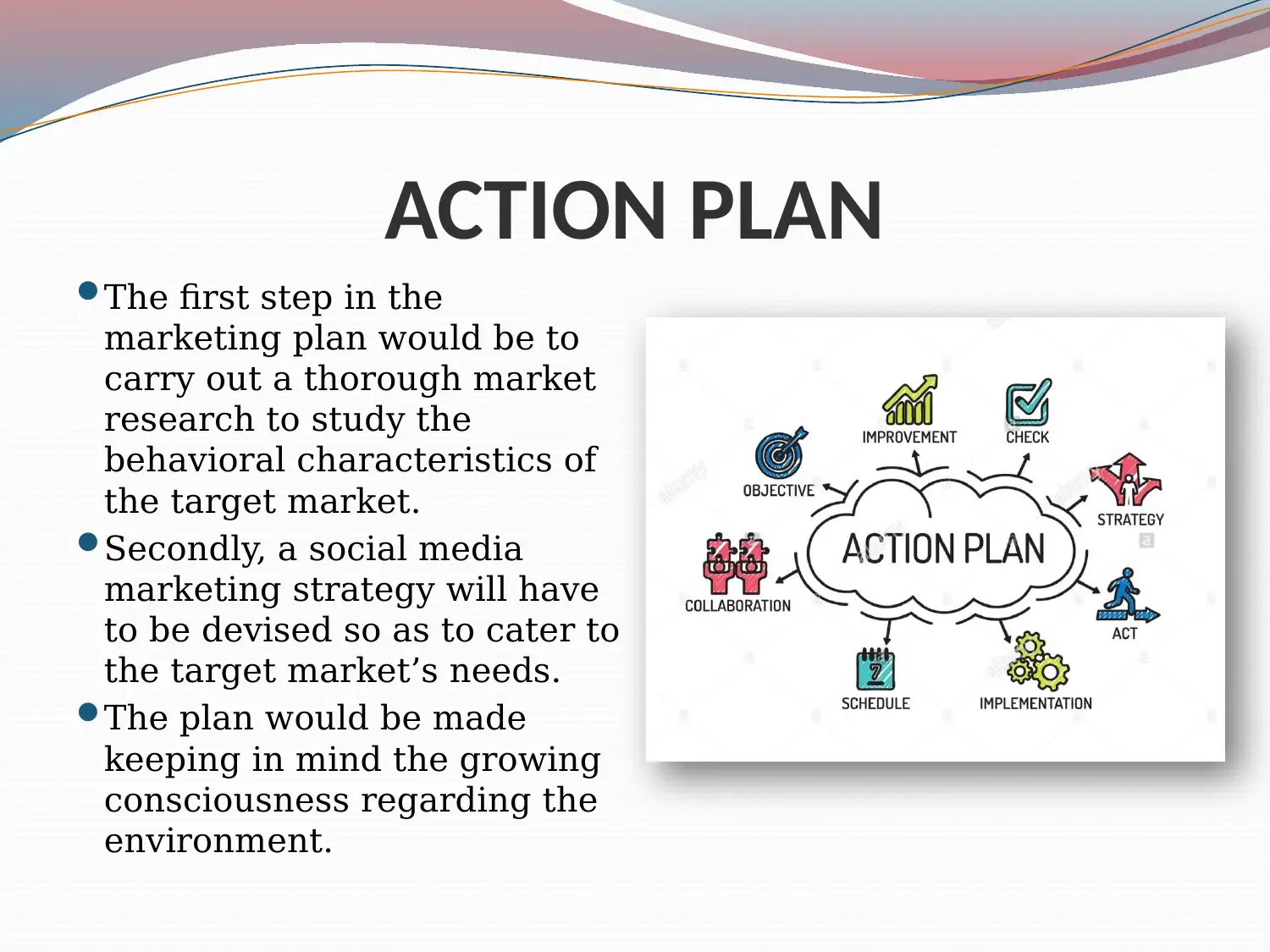
ACTION PLAN
The first step in the
marketing plan would be to
carry out a thorough market
research to study the
behavioral characteristics of
the target market.
Secondly, a social media
marketing strategy will have
to be devised so as to cater to
the target market’s needs.
The plan would be made
keeping in mind the growing
consciousness regarding the
environment.
The first step in the
marketing plan would be to
carry out a thorough market
research to study the
behavioral characteristics of
the target market.
Secondly, a social media
marketing strategy will have
to be devised so as to cater to
the target market’s needs.
The plan would be made
keeping in mind the growing
consciousness regarding the
environment.
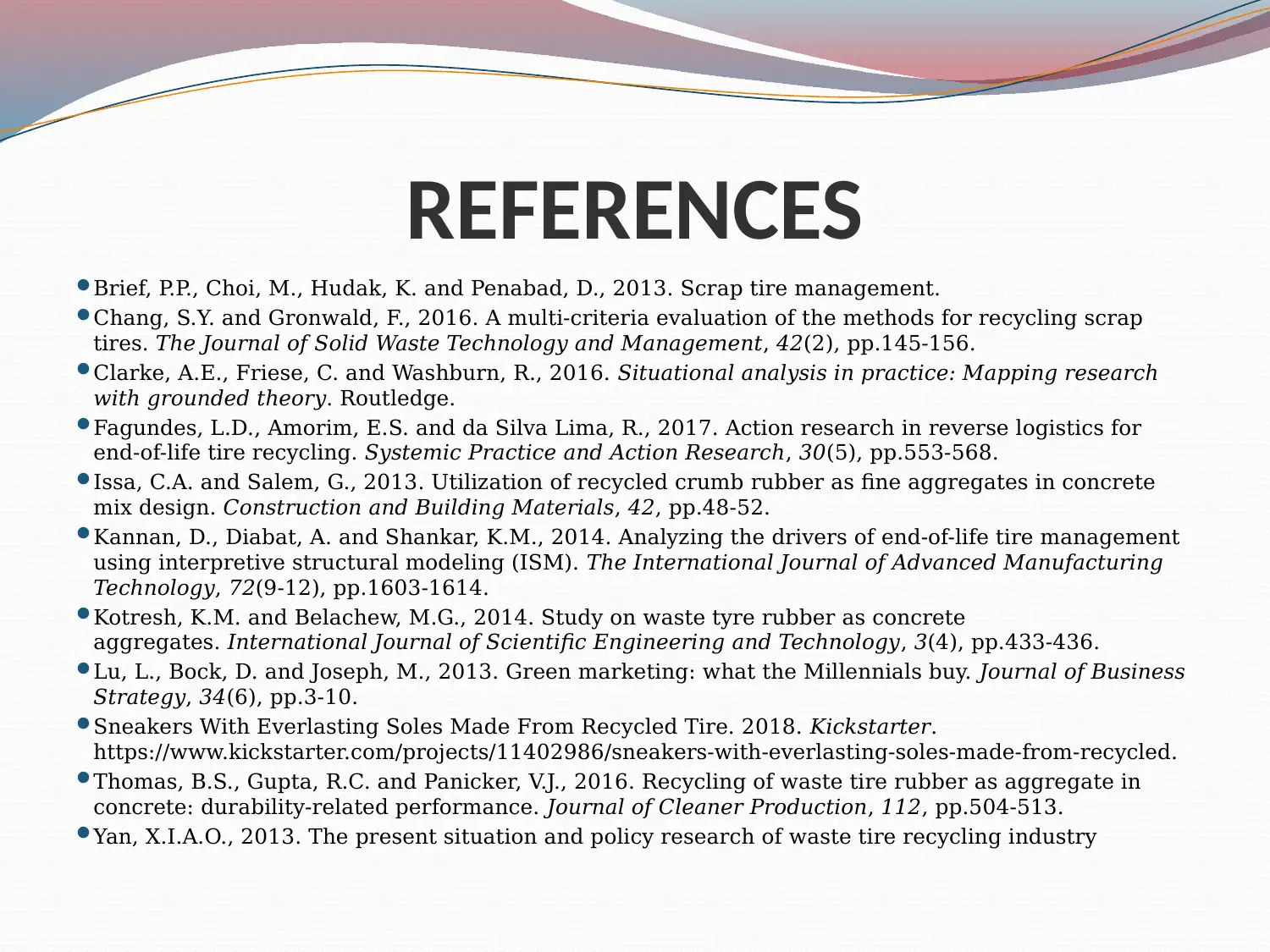
REFERENCES
Brief, P.P., Choi, M., Hudak, K. and Penabad, D., 2013. Scrap tire management.
Chang, S.Y. and Gronwald, F., 2016. A multi-criteria evaluation of the methods for recycling scrap
tires. The Journal of Solid Waste Technology and Management, 42(2), pp.145-156.
Clarke, A.E., Friese, C. and Washburn, R., 2016. Situational analysis in practice: Mapping research
with grounded theory. Routledge.
Fagundes, L.D., Amorim, E.S. and da Silva Lima, R., 2017. Action research in reverse logistics for
end-of-life tire recycling. Systemic Practice and Action Research, 30(5), pp.553-568.
Issa, C.A. and Salem, G., 2013. Utilization of recycled crumb rubber as fine aggregates in concrete
mix design. Construction and Building Materials, 42, pp.48-52.
Kannan, D., Diabat, A. and Shankar, K.M., 2014. Analyzing the drivers of end-of-life tire management
using interpretive structural modeling (ISM). The International Journal of Advanced Manufacturing
Technology, 72(9-12), pp.1603-1614.
Kotresh, K.M. and Belachew, M.G., 2014. Study on waste tyre rubber as concrete
aggregates. International Journal of Scientific Engineering and Technology, 3(4), pp.433-436.
Lu, L., Bock, D. and Joseph, M., 2013. Green marketing: what the Millennials buy. Journal of Business
Strategy, 34(6), pp.3-10.
Sneakers With Everlasting Soles Made From Recycled Tire. 2018. Kickstarter.
https://www.kickstarter.com/projects/11402986/sneakers-with-everlasting-soles-made-from-recycled.
Thomas, B.S., Gupta, R.C. and Panicker, V.J., 2016. Recycling of waste tire rubber as aggregate in
concrete: durability-related performance. Journal of Cleaner Production, 112, pp.504-513.
Yan, X.I.A.O., 2013. The present situation and policy research of waste tire recycling industry
Brief, P.P., Choi, M., Hudak, K. and Penabad, D., 2013. Scrap tire management.
Chang, S.Y. and Gronwald, F., 2016. A multi-criteria evaluation of the methods for recycling scrap
tires. The Journal of Solid Waste Technology and Management, 42(2), pp.145-156.
Clarke, A.E., Friese, C. and Washburn, R., 2016. Situational analysis in practice: Mapping research
with grounded theory. Routledge.
Fagundes, L.D., Amorim, E.S. and da Silva Lima, R., 2017. Action research in reverse logistics for
end-of-life tire recycling. Systemic Practice and Action Research, 30(5), pp.553-568.
Issa, C.A. and Salem, G., 2013. Utilization of recycled crumb rubber as fine aggregates in concrete
mix design. Construction and Building Materials, 42, pp.48-52.
Kannan, D., Diabat, A. and Shankar, K.M., 2014. Analyzing the drivers of end-of-life tire management
using interpretive structural modeling (ISM). The International Journal of Advanced Manufacturing
Technology, 72(9-12), pp.1603-1614.
Kotresh, K.M. and Belachew, M.G., 2014. Study on waste tyre rubber as concrete
aggregates. International Journal of Scientific Engineering and Technology, 3(4), pp.433-436.
Lu, L., Bock, D. and Joseph, M., 2013. Green marketing: what the Millennials buy. Journal of Business
Strategy, 34(6), pp.3-10.
Sneakers With Everlasting Soles Made From Recycled Tire. 2018. Kickstarter.
https://www.kickstarter.com/projects/11402986/sneakers-with-everlasting-soles-made-from-recycled.
Thomas, B.S., Gupta, R.C. and Panicker, V.J., 2016. Recycling of waste tire rubber as aggregate in
concrete: durability-related performance. Journal of Cleaner Production, 112, pp.504-513.
Yan, X.I.A.O., 2013. The present situation and policy research of waste tire recycling industry
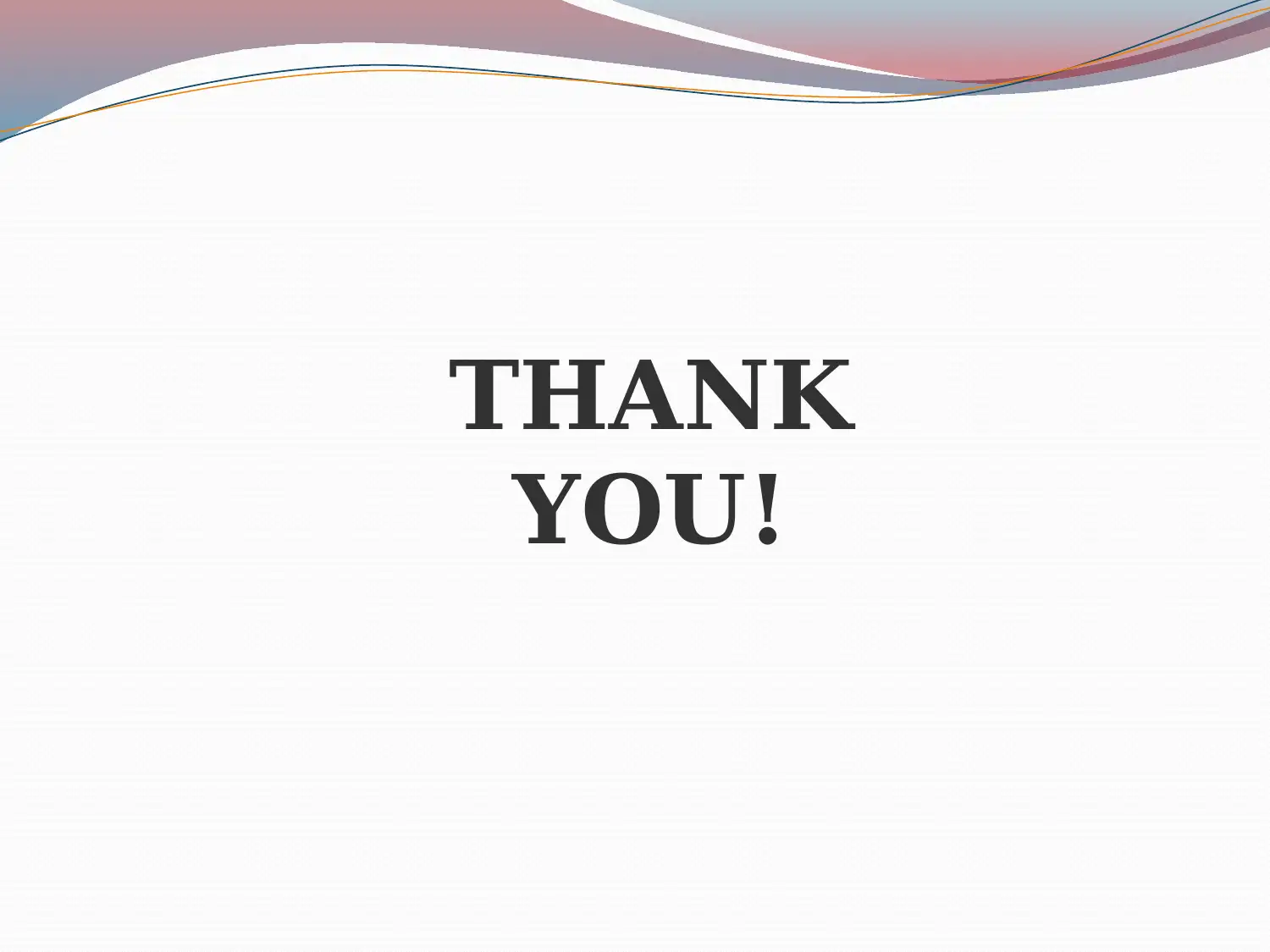
THANK
YOU!
YOU!
1 out of 28
Related Documents
Your All-in-One AI-Powered Toolkit for Academic Success.
+13062052269
info@desklib.com
Available 24*7 on WhatsApp / Email
![[object Object]](/_next/static/media/star-bottom.7253800d.svg)
Unlock your academic potential
© 2024 | Zucol Services PVT LTD | All rights reserved.